Educational Workshops On Rural Tourism in Dalmatia Have Started
November 24, 2021 - The first of 12 educational workshops on rural tourism in Dalmatia, organized by the Croatian Rural Tourism Association and the Zagora Local Action Group, was held in Dugopolje on Monday. You can still sign up in order to receive more information to promote your services.
The workshop discussed the legislative framework and challenges, new tourism trends, the importance of cultural heritage, and the importance of regular digital communication, reports HrTurizam. Participants were also introduced to the Digital Catalog of Rural Tourism, which provides rural tourism service providers with free promotion in domestic and foreign markets. The catalog includes agricultural holdings that have registered wineries, tasting rooms, picnic areas, agritourism, rural accommodation facilities, and the like.
“The digital catalog is an extraordinary opportunity to finally consolidate data on rural tourism service providers throughout Croatia. Not only is this important for their promotion, but it will also help us in the tourist boards, but also colleagues from domestic and foreign travel agencies who will be able to see the entire offer of rural tourism in a particular destination in one place", said Tomislav Balić at the workshop, director of the Tourist Board of the Municipality of Dugopolje.
The participants of the workshop pointed out numerous problems of rural space that they encounter in their work, from basic working conditions such as water, sewerage, etc., to spatial plans that often change in a non-transparent way without taking into account the development needs of the real sector.
“Agriculture and tourism are the mainstays of rural development, and rural tourism provides a handful of opportunities to generate additional income, thus increasing the overall well-being of local communities. By joint cooperation of all actors, especially those involved in local action groups, these problems should be solved faster and more efficiently, which we will work on in the future", said Marijana Botić Rogošić, head of the LAG Zagora.
The two-hour workshops are organized in cooperation with tourist boards and local action groups, with the financial support of the Ministry of Tourism and Sports, and are led by Aleksandra Kuratko Pani, head of the Croatian Rural Tourism Association.
Interested participants attend workshops on rural tourism in Dalmatia, in the Split-Dalmatia and Dubrovnik-Neretva counties, which will be held until 3.12. they can apply via the form on the website of the Association, where they can also get additional information about the workshops. Applications for workshops in Zadar and Šibenik-Knin County will be possible from next week.
The association invites all providers of services of rural tourism in Dalmatia, such as farmers who are also engaged in the provision of catering or tourism services to attend workshops in as many numbers as possible to get important information about opportunities for free promotion of their facilities.
For more, make sure to check out our dedicated lifestyle section.
Discovering Authentic Croatia's Secrets With Seoski Tourism
November 4, 2021 – Village tourism or countryside tourism - Seoski tourism in Croatia - offers authentic, traditional experiences. Aleksandra Kuratko, secretary of Udruga ruralnog turizma Hrvatske (Croatian Rural Tourism Association) tells us more about it, and their work to help facilitate it
Croatia's visitor offer is evolving and expanding. There are exciting aspects of authentic Croatia to be discovered. Away from the beach, villages inland often look remarkably similar to how they did one hundred years ago. There, crops are grown and produce made in ways passed down through generations of families. And, in some lucky instances, these family farmers are willing to open their doors, invite you inside and show you how they live.
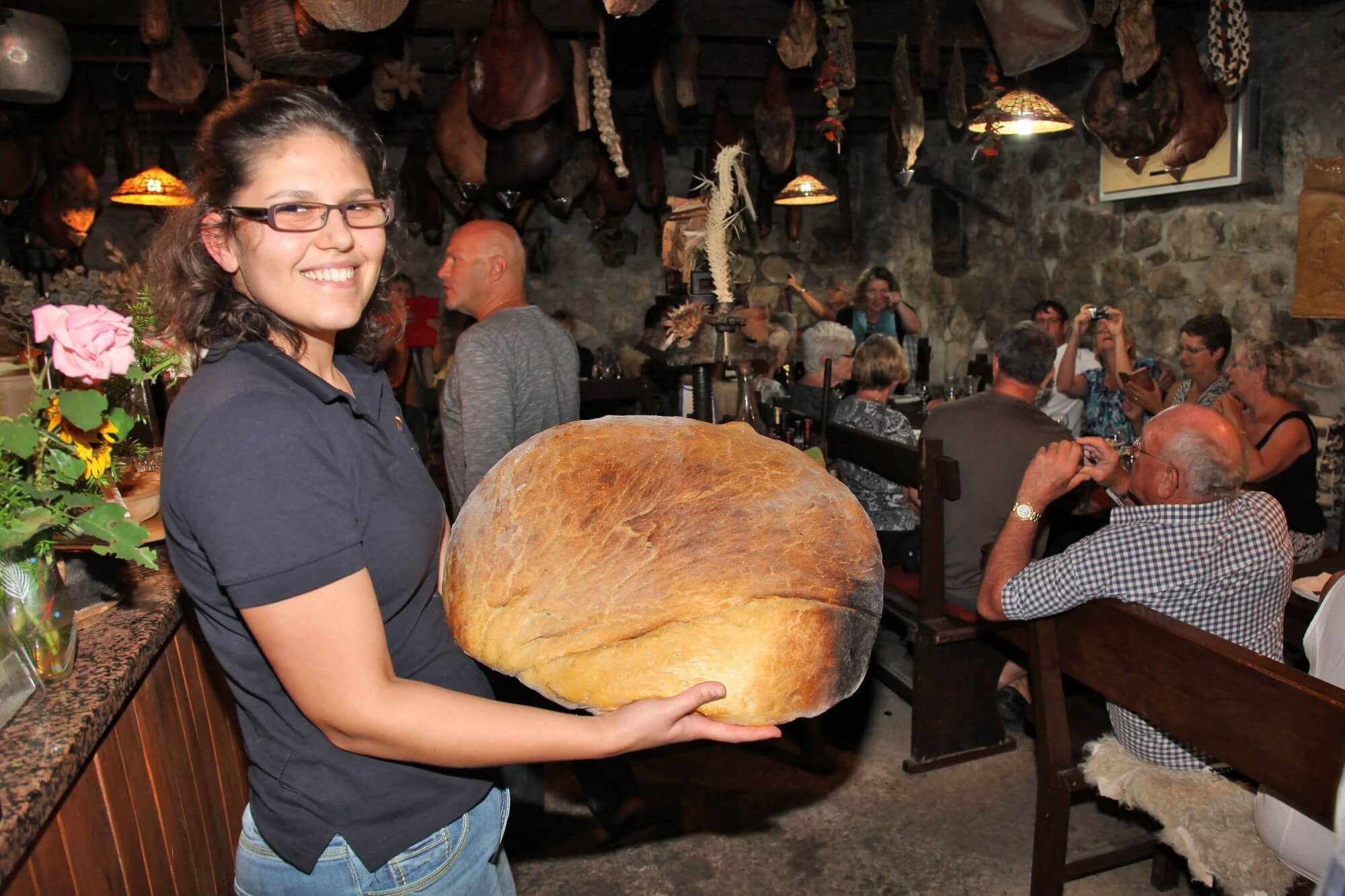 Bread from the peka at Agroturizam Antunović on Pelješac
Bread from the peka at Agroturizam Antunović on Pelješac
Seoski Tourism – translated as either village tourism or countryside tourism – is just that. Family farms that offer hospitality. These are some of the most homely and most welcoming accommodation experiences you can have in Croatia. Offering sights and sounds, tastes and flavours that you can't find anywhere else, visits or stays in Seoski Tourism places have long been loved by locals for weekend breaks or holidays outside peak summer. But, increasingly, these authentic Croatia experiences are being discovered by international visitors.
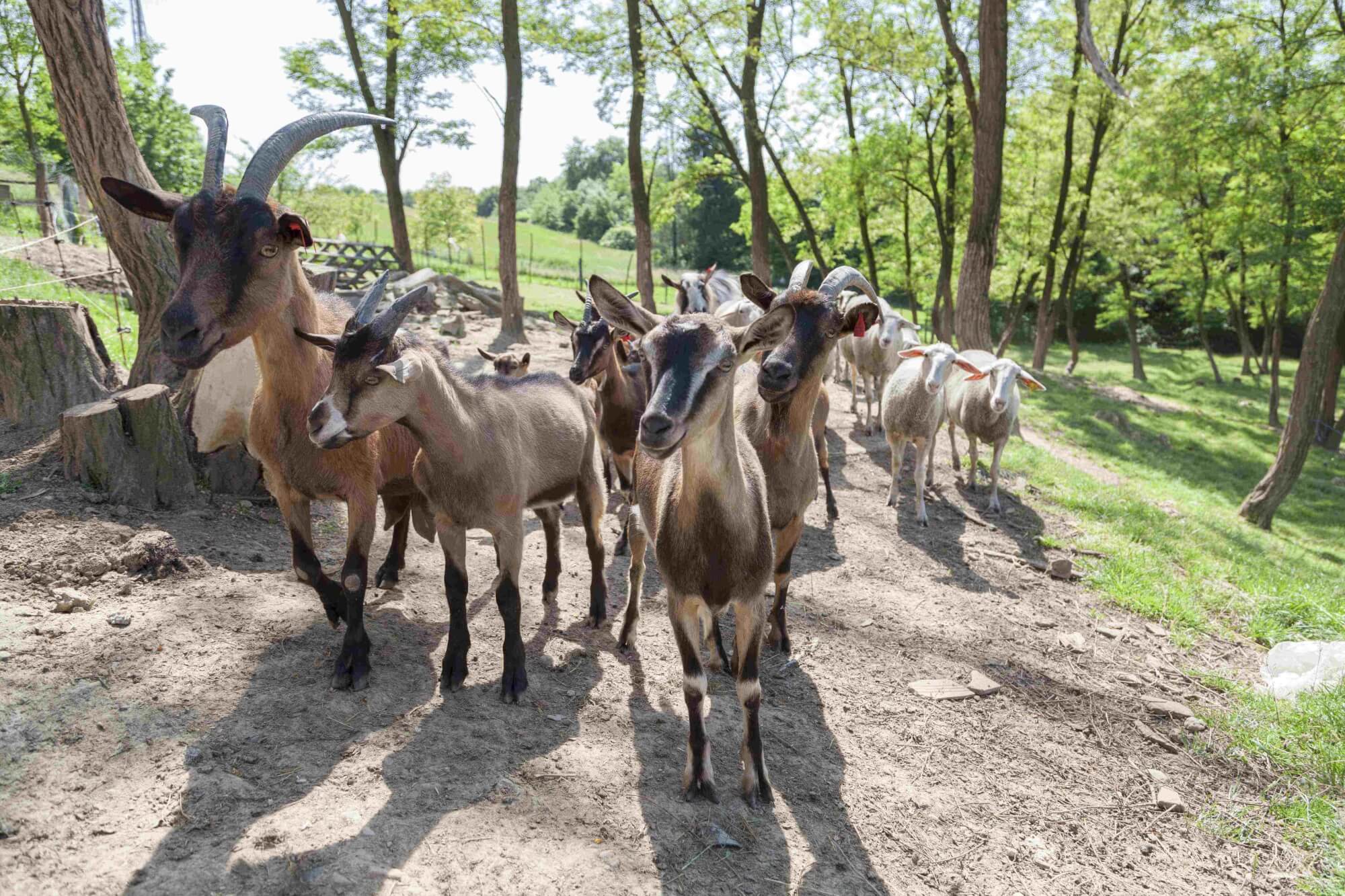 Moslavina goats at Kezele family farm © Davor Konjikušić
Moslavina goats at Kezele family farm © Davor Konjikušić
One institution trying to facilitate the growth in interest is Udruga ruralnog turizma Hrvatske - Croatian Rural Tourism Association. Since it was formed in 2016, they have tried to bring together Croatia's family farm hosts, to promote them and educate them, and to build bridges between these independents and tourist boards, tourist agencies, educators and even the wider world outside Croatia.
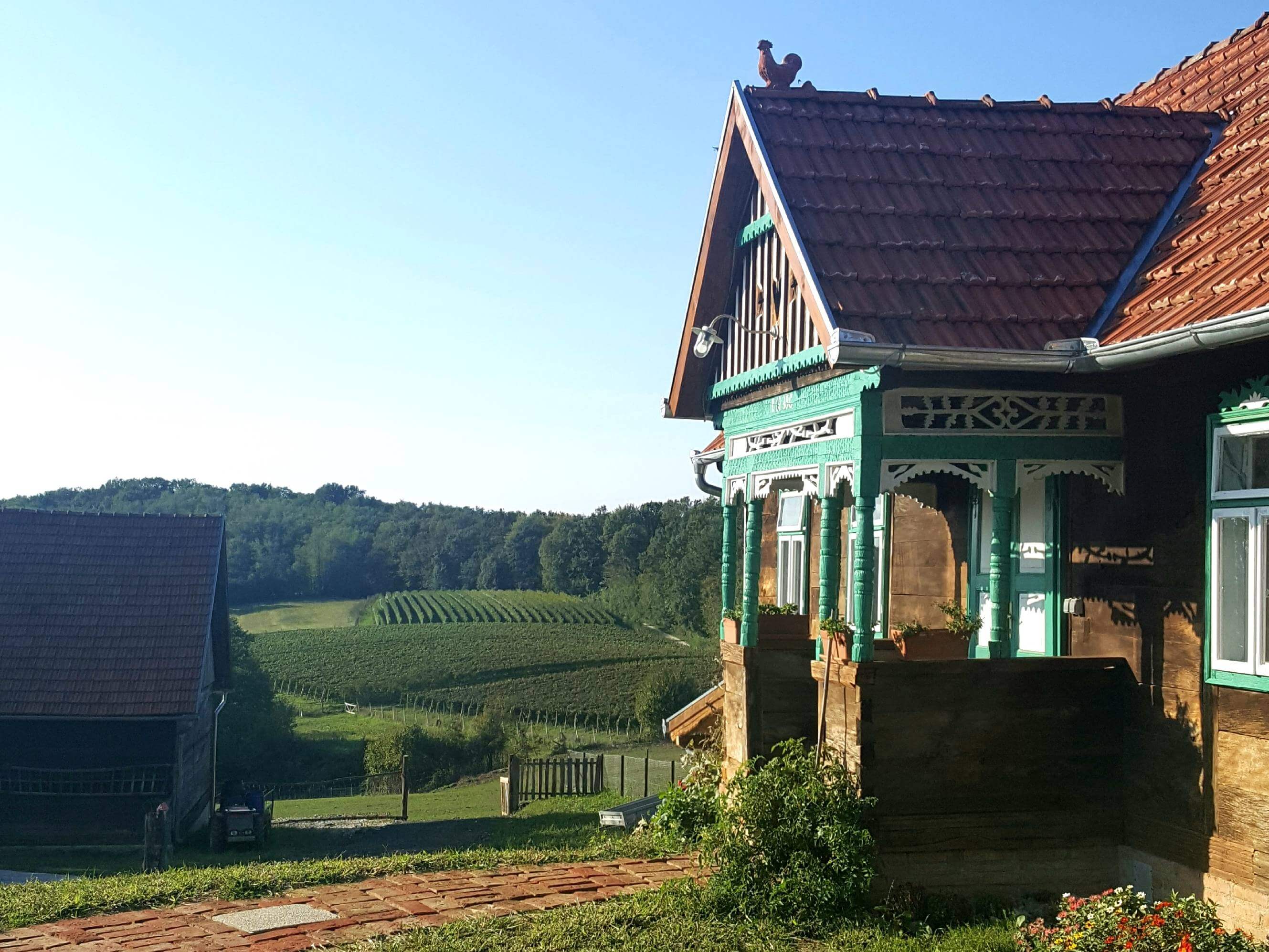 Seoski turizam Kezele in Šumećani, on the border of Zagreb County and Bjelovar Bilogora County © Davor Konjikušić
Seoski turizam Kezele in Šumećani, on the border of Zagreb County and Bjelovar Bilogora County © Davor Konjikušić
Based in Ivanić-Grad, Zagreb County, the Croatian Rural Tourism Association is currently touring the length and breadth of the country, holding workshops with as many Seoski Tourism family farms that will come. And if the farmwork doesn't allow them free time, then they can attend Croatian Rural Tourism Association workshops online.
On the eve of the association's online Seoski Tourism workshops for Central Croatia and Slavonia, TCN interviewed Aleksandra Kuratko, secretary of Udruga ruralnog turizma Hrvatske, to find out more about Seoski Tourism in Croatia.
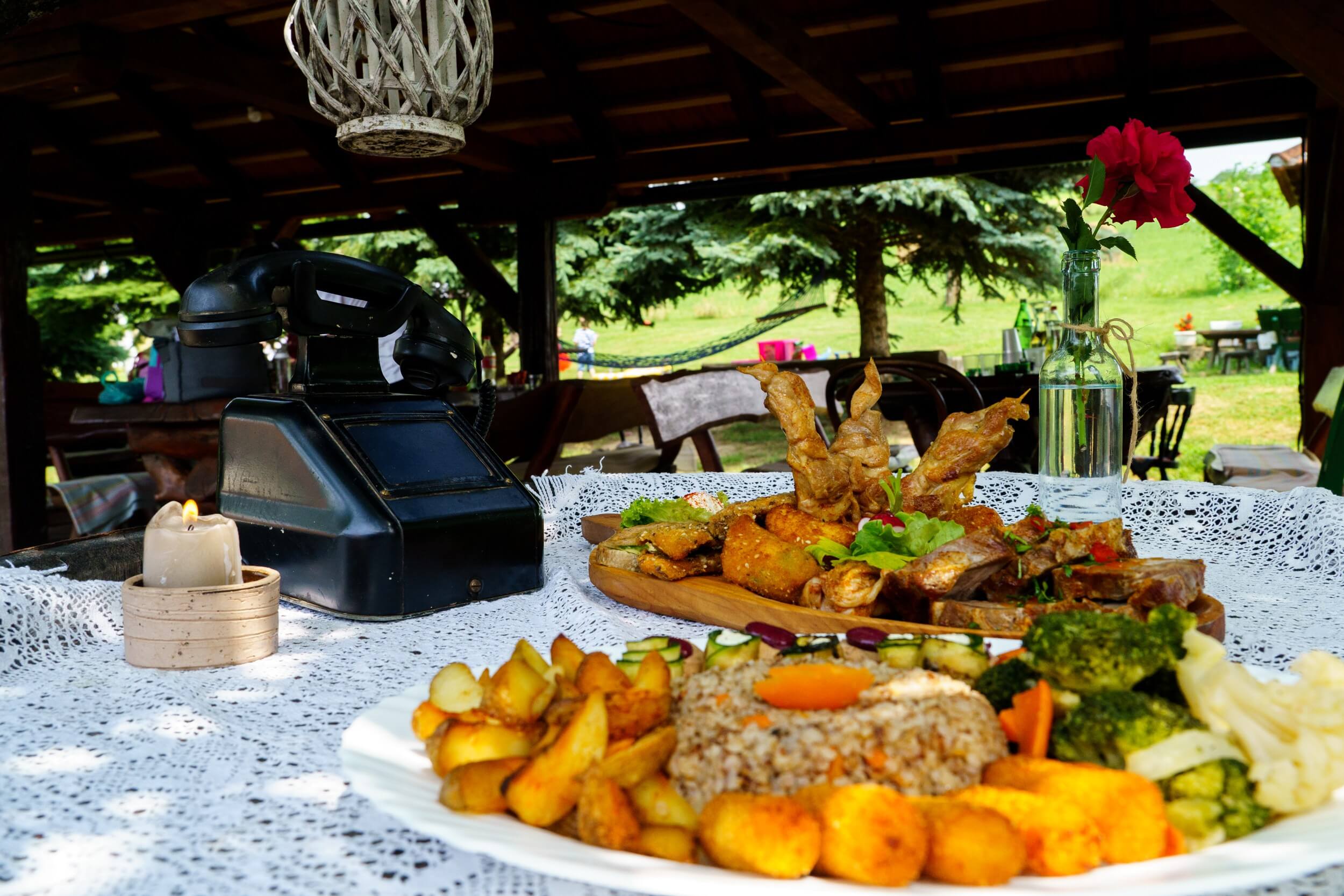 Prigorje specialties at Rakić family farm
Prigorje specialties at Rakić family farm
My name is Aleksandra Kuratko and I am secretary of Udruga ruralnog turizma Hrvatske. As an association, we are 5 years old.
We have 35 members, most of whom are service providers in what we call Seoski Tourism. We also have several tourist boards and two educational institutions as members.
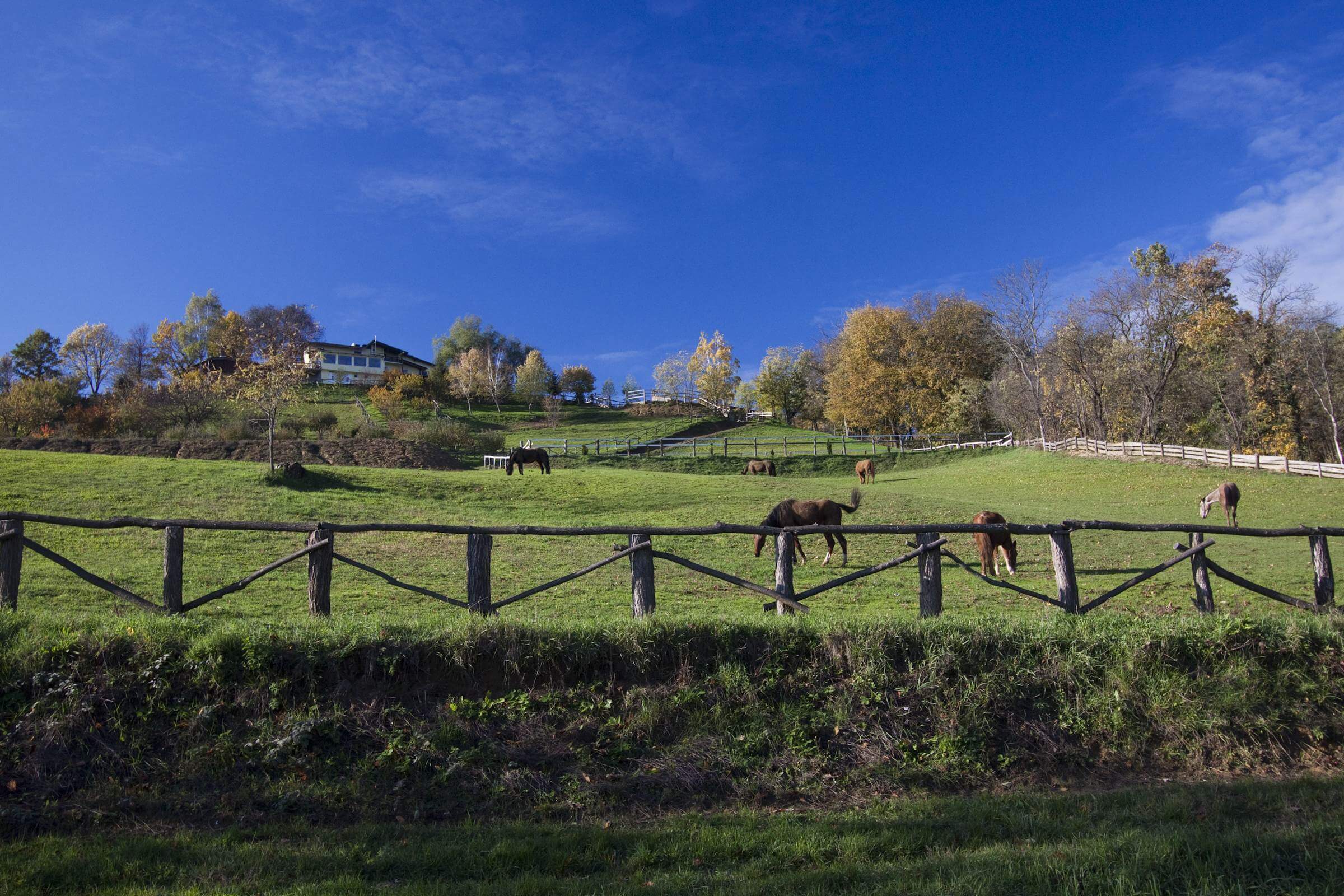 Bilogora horses in autumn at Agroturizam Na malenom brijegu © Vladimir Vlajinić
Bilogora horses in autumn at Agroturizam Na malenom brijegu © Vladimir Vlajinić
Seoski tourism is not quite the same as rural tourism, because rural tourism is many different types of tourism that happen in rural areas. Seoski tourism - which you might translate as village tourism - is quite specific. We assemble people who work in agriculture and who, at the same time, are also offering hospitality. In English, you might call them Farm Stays. Or Agro-tourism – a merging of agriculture and tourism.
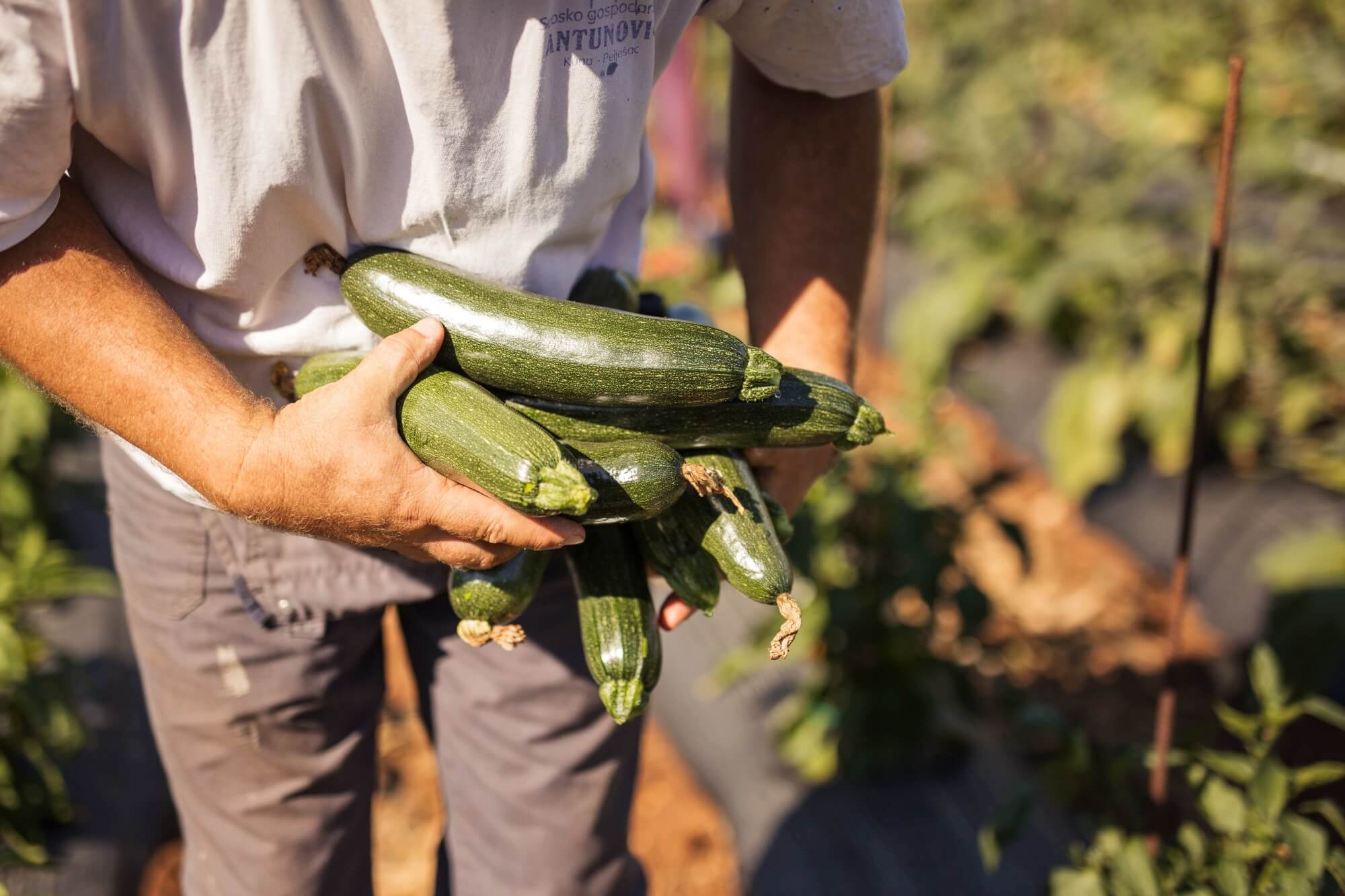 Fresh vegetables at Agroturizam Antunović on Pelješac
Fresh vegetables at Agroturizam Antunović on Pelješac
People who work on agricultural estates often take care of local cultural heritage. For example, they might maintain and renew traditional wooden or stone houses. Many also have etno collections, in which they preserve different objects from their region. Some of these objects might have been used in agriculture and households hundreds of years ago. So, they are preserving the cultural heritage of Croatian villages. This is what we call material cultural heritage. But, there's another kind.
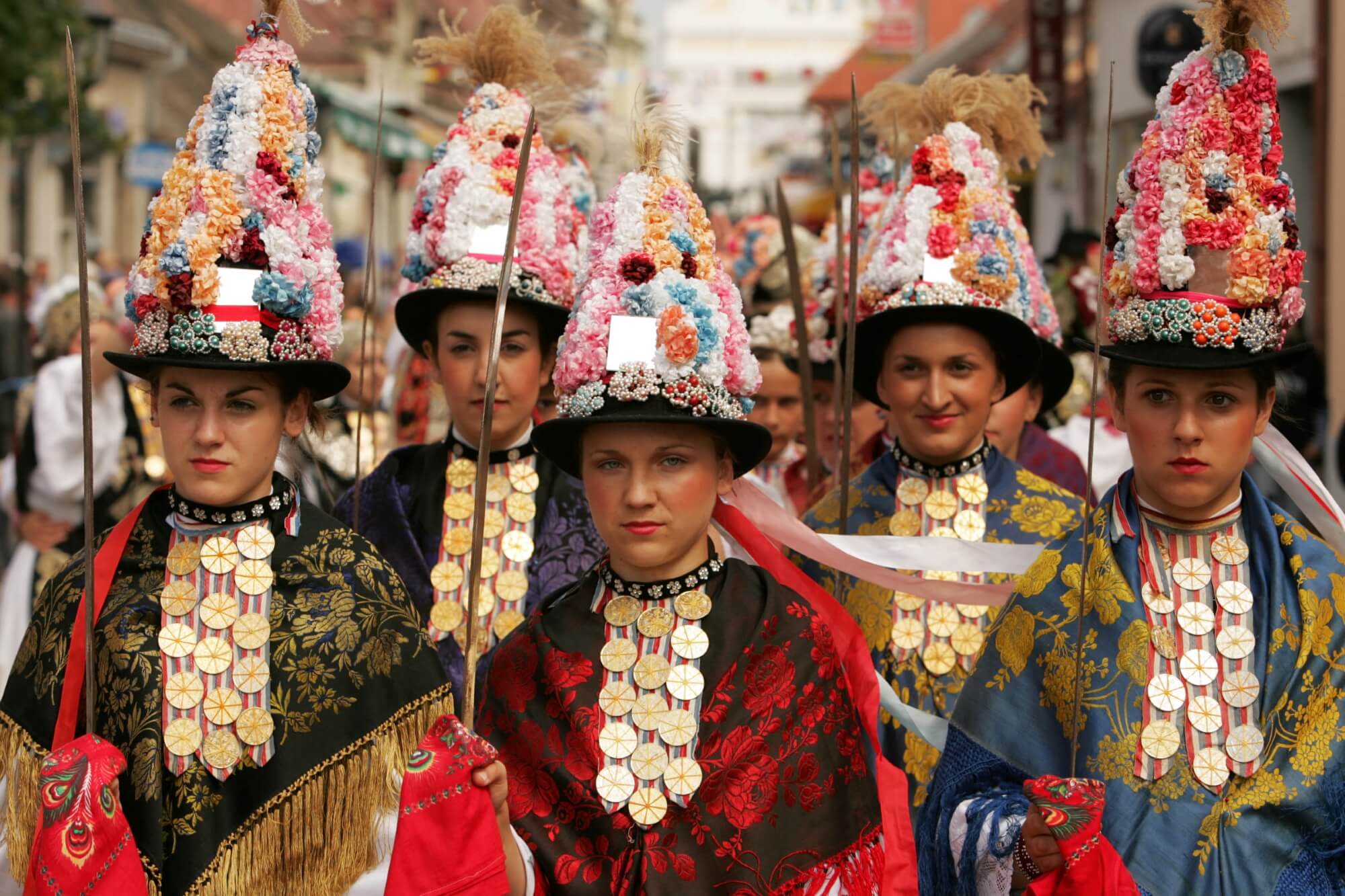 Cultural heritage preserved in one Slavonian village © Mario Romulić
Cultural heritage preserved in one Slavonian village © Mario Romulić
Non-material cultural heritage is also a part. That might be preserving old recipes of traditional, regionally-specific dishes. Or, it might be showcasing the songs and dance of local music.
We are currently running a project which is supported by the Croatian Ministry of Tourism and Sports in which we hold 37 Seoski Tourism workshops in the field all over Croatia. There will also be around 15 online workshops. The workshops are aimed at colleagues who currently operate in Seoski Tourism – they work in agriculture and offer hospitality. Also invited are local tourist boards and local action groups.
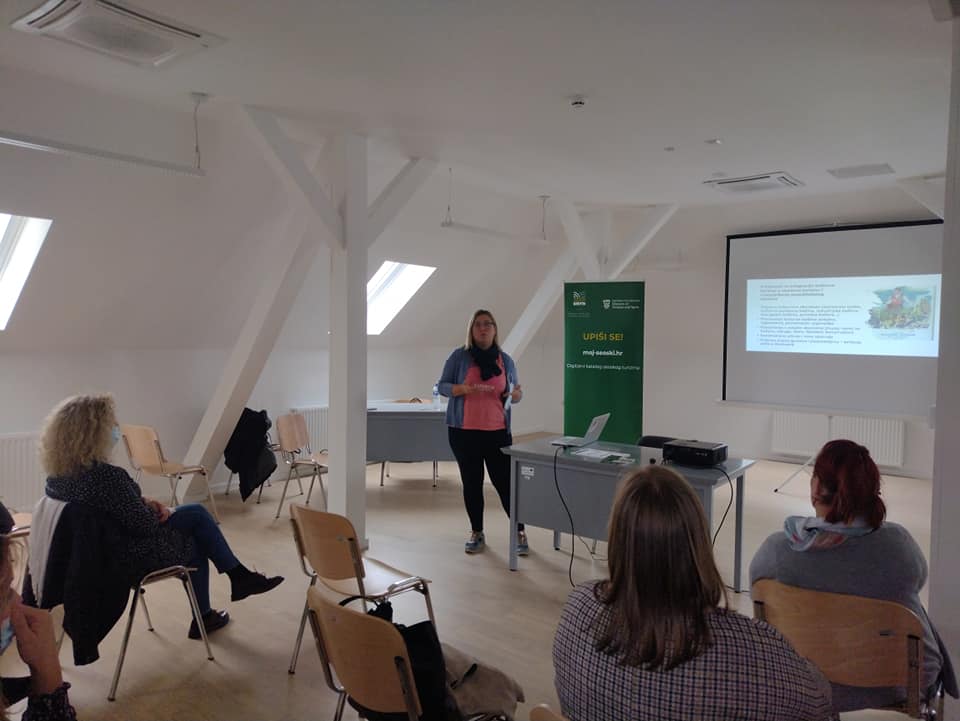 Photo from URTH workshop in Slatina
Photo from URTH workshop in Slatina
So far, we conducted 20 workshops in the regions of Central Croatia, Slavonia and Baranja, and Podunavlje. From next week until the end of the year, we will conduct the workshops in Istria, Kvarner, Lika and Dalmatia. Some service providers were not able to attend earlier workshops, because of work commitments of Covid. So, we decided to also offer access to the workshops online. Tomorrow is our first online workshop for Central Croatia and on Friday it's the online workshop for Slavonia.
These workshops are interactive discussions between our association, service providers and all other stakeholders. We discuss the legislative framework, which can be extremely complex. We talk about new trends in tourism for the post-pandemic era. We also discuss the importance of integrating cultural heritage in digital promotion.
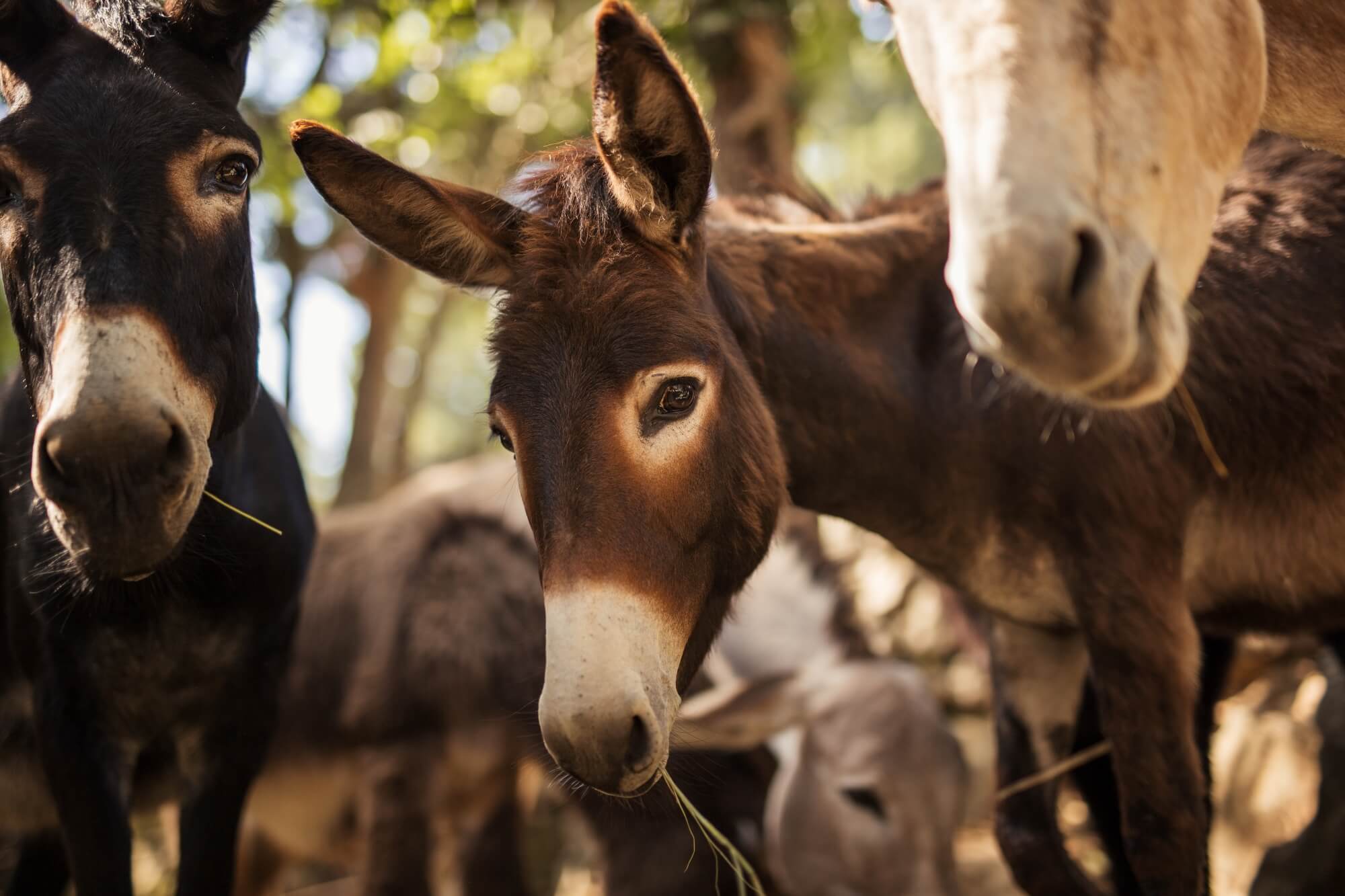 Donkey farm at Agroturizam Antunović on Pelješac
Donkey farm at Agroturizam Antunović on Pelješac
For the legislative framework, we have initiated the formation of a working group for the development of Seoski Tourism, which is now operating in the Croatian Ministry of Tourism and Sports. So, at the workshops, we ask if anyone is having issues. We collect the responses and address them in the working group.
Part of the workshop is the presentation of a new web application of Seoski Tourism, which we have developed with Croatian Ministry of Tourism and Sports. It has two purposes. One is to create a digital catalogue of Croatian Seoski Tourism. You can see region by region some of the Seoski Tourism options – currently around 40, those who have already enrolled.
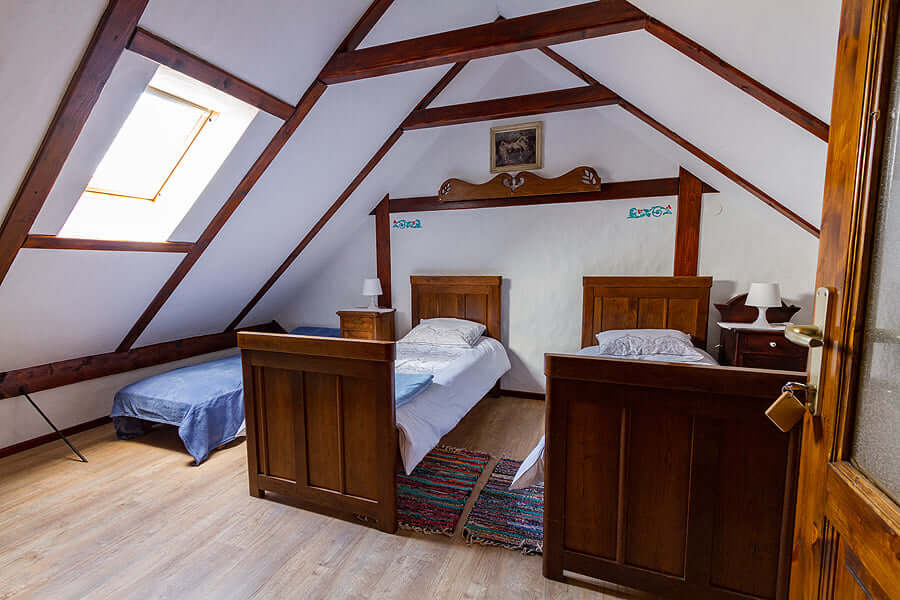 Podravina Etno rooms at Zlatni klas Otrovanec
Podravina Etno rooms at Zlatni klas Otrovanec
A version of the app is currently available on the website of the National Tourist Board. But, they are building a new website. The forthcoming version of the catalogue will likely be more user-friendly with many more functions and options. On the new website, Croatia's Seoski Tourism options will be detailed in many different languages. It should be a great resource not only for tourists but for travel agencies, journalists like you and for educational institutions. That's the reason we are devoting time in our workshops to encourage Seoski Tourism providers to enroll. We are just at the beginning of the process.
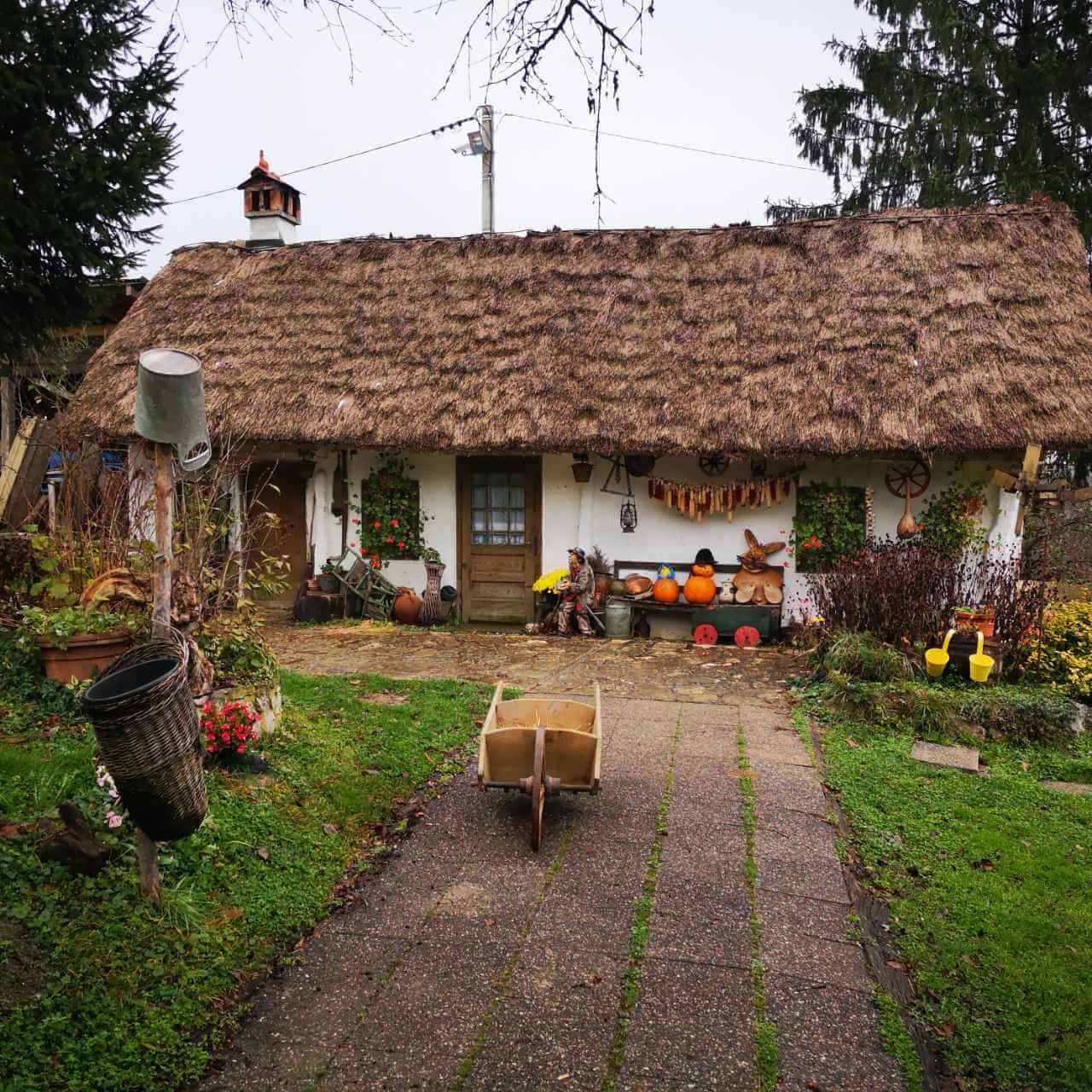 Grešna pilnica in Zagorje © Jasna Podboj
Grešna pilnica in Zagorje © Jasna Podboj
The second purpose of the app is to collect information about the service providers. This info will be used by our working group when defining a Croatian model of Seoski Tourism. So far, we have taken examples from Slovenia, Italy and other countries that are successful with Seoski Tourism. But, these models were entered into our legislative system without fully considering our distinct business and cultural environments. That is now about to change.
We are very happy that, following many years of partially successful advocacy, there is now political will at a ministerial level to really shape things up, to change the laws and regulations in order to facilitate Seoski Tourism. We want to encourage more Seoski Tourism, not to have people from agriculture being turned away because of the difficulty of the process and bureaucracy.
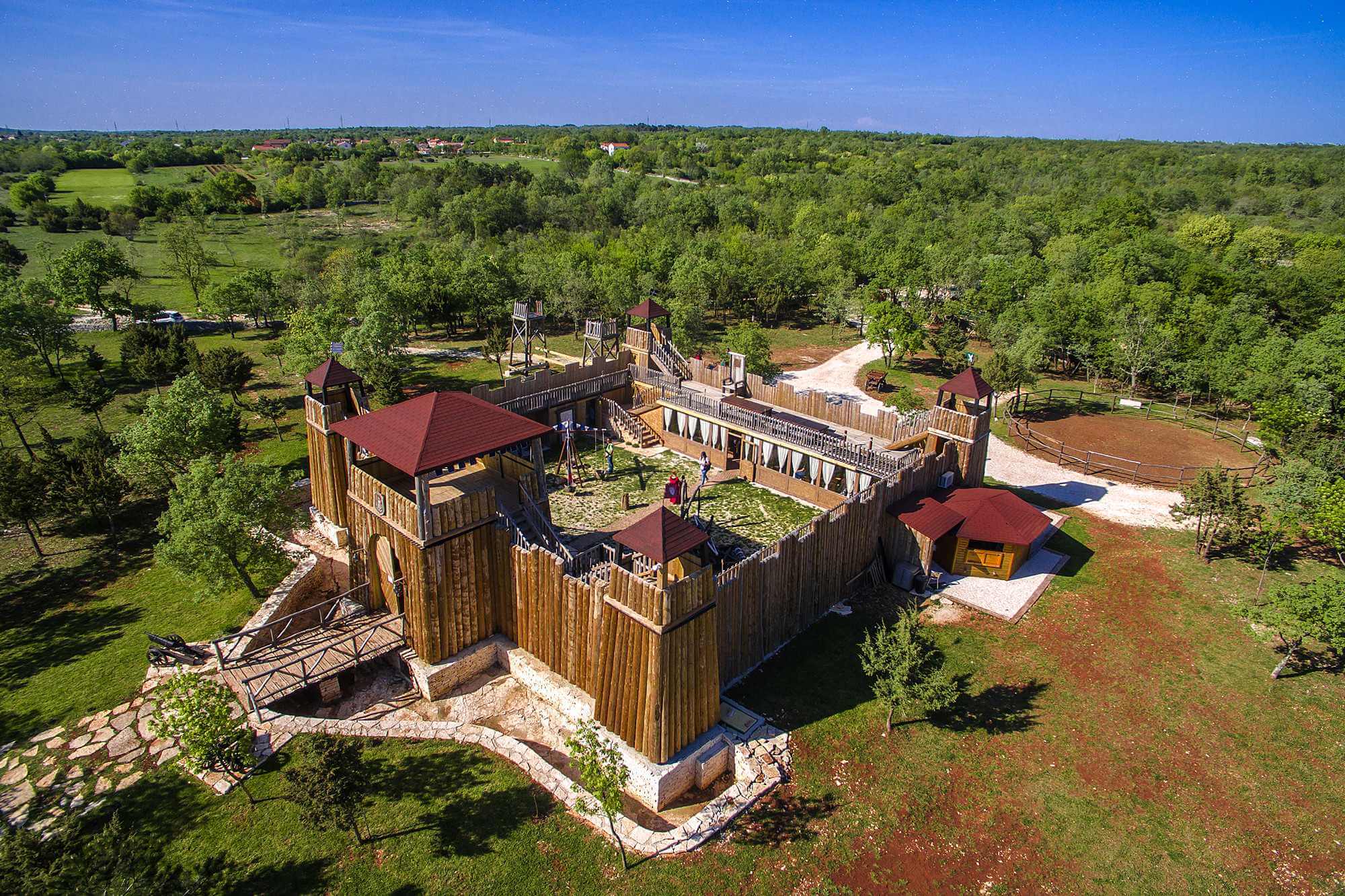 Medieval Theme Park San Michael © Silvia Otočan
Medieval Theme Park San Michael © Silvia Otočan
You said part of the workshops will focus on new trends. What are some of these?
Research has been done by a working group that is developing a new tourism strategy for Croatia. It's called Strategy for Sustainable Tourism to 2030. Under the auspices of this group, a number of research fields have been analysed.
The collected data shows that a huge percentage of tourists are now more inclined to eat locally grown and healthy food. They want to spend their time on estates that are run in accordance with ecological principles. So, they really care about issues like how waste is disposed of etc. They also pay a lot of attention to culture. They are curious to learn exactly how we are living, how we are working and how we produce things. They want to learn about our society and culture. And, importantly, they really care about how they spend their money. Above all, they want to spend money in areas that can help support local communities.
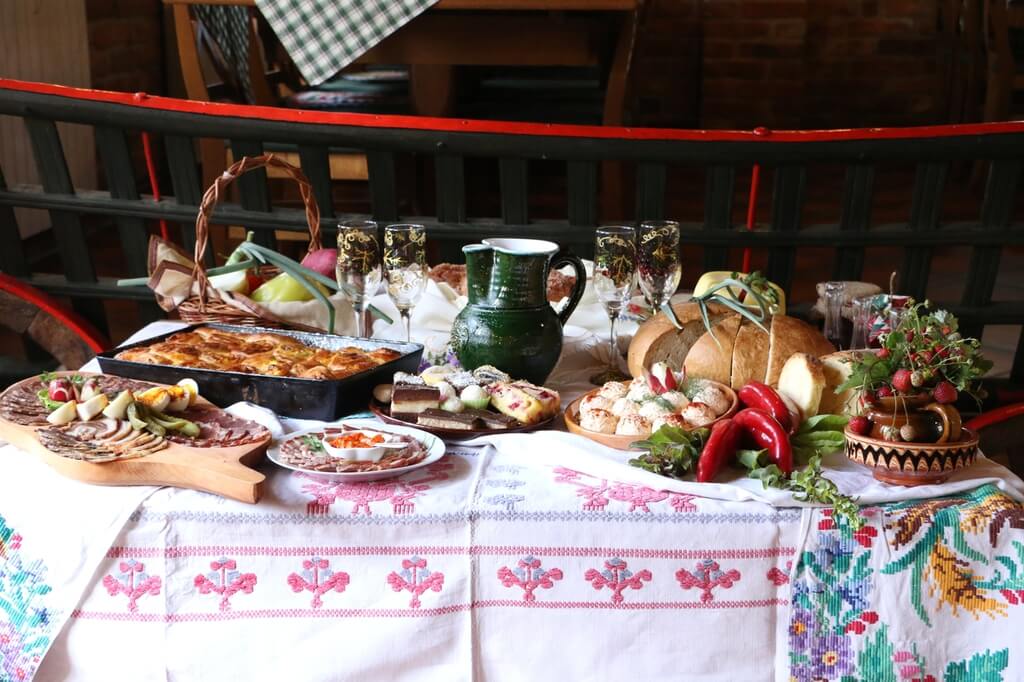 Prigorje Breakfast at Rakić Family Farm
Prigorje Breakfast at Rakić Family Farm
For us, this is really important. Because Seoski Tourism answers these demands to an incredibly high level. We do produce local, healthy food. Not only on the agricultural estates where you can experience Seoski Tourism, but also from their neighbours who just do agriculture. We are concerned with ecology, we protect cultural heritage and the money spent in Seoski Tourism stays in local communities, where it has very beneficial effects.
In the digital promotion part of the workshops we are trying to persuade people about the importance of their online presence. Basically, these days, if you're not online, it's almost like you don't exist. So, we try to explain the importance of having good-quality photos, short videos and a regular online presence.
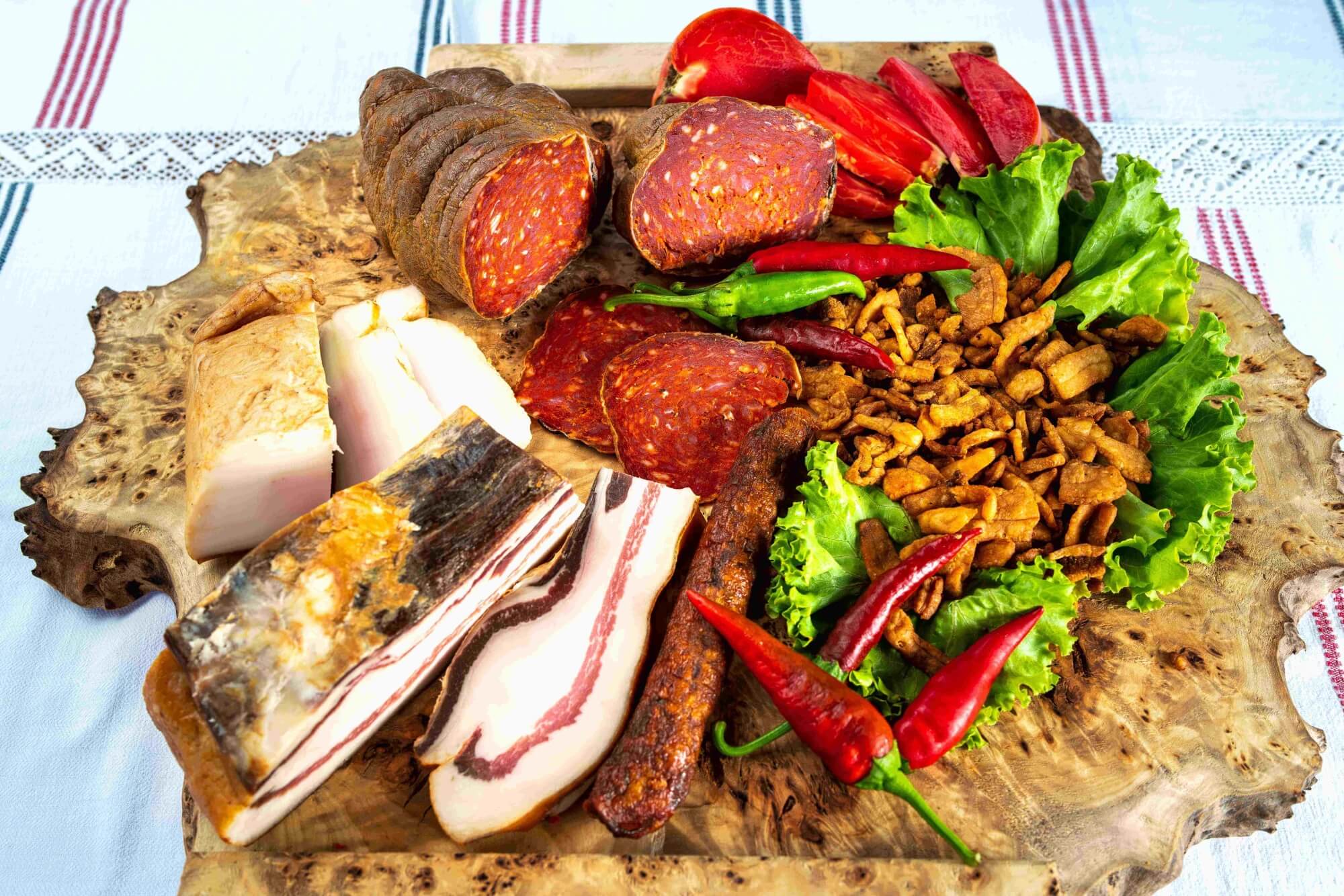 Kulen, čvarci and other specialties at Baranjska kuća © Denis Despot
Kulen, čvarci and other specialties at Baranjska kuća © Denis Despot
That's interesting. In some cases, it might be like two different worlds colliding - people who work in a traditional industry and a traditional environment having to adapt to a very modern way of operating. There's also another potential collision when providers learn of the expectations within modern tourism. Because these people can no longer just work in agriculture. To operate in Seoski Tourism, you're also very much expected to also be a host.
Yes. All of our current service providers who are successful within Seoski Tourism are also great hosts. It's essential. You can see it in almost all of the reviews for this kind of tourism. Guests come for the food and drinks and surroundings, yes. But, what they value the most, what they remember the most, is the host part of the experience. On the estates of Croatian Seoski Tourism, guests are welcomed like family. Across all of Croatian tourism we are expected to be good hosts. It's part of our reputation and the reason why many people come here from all over the world. In Seoski Tourism, it is vital we live up to those expectations.
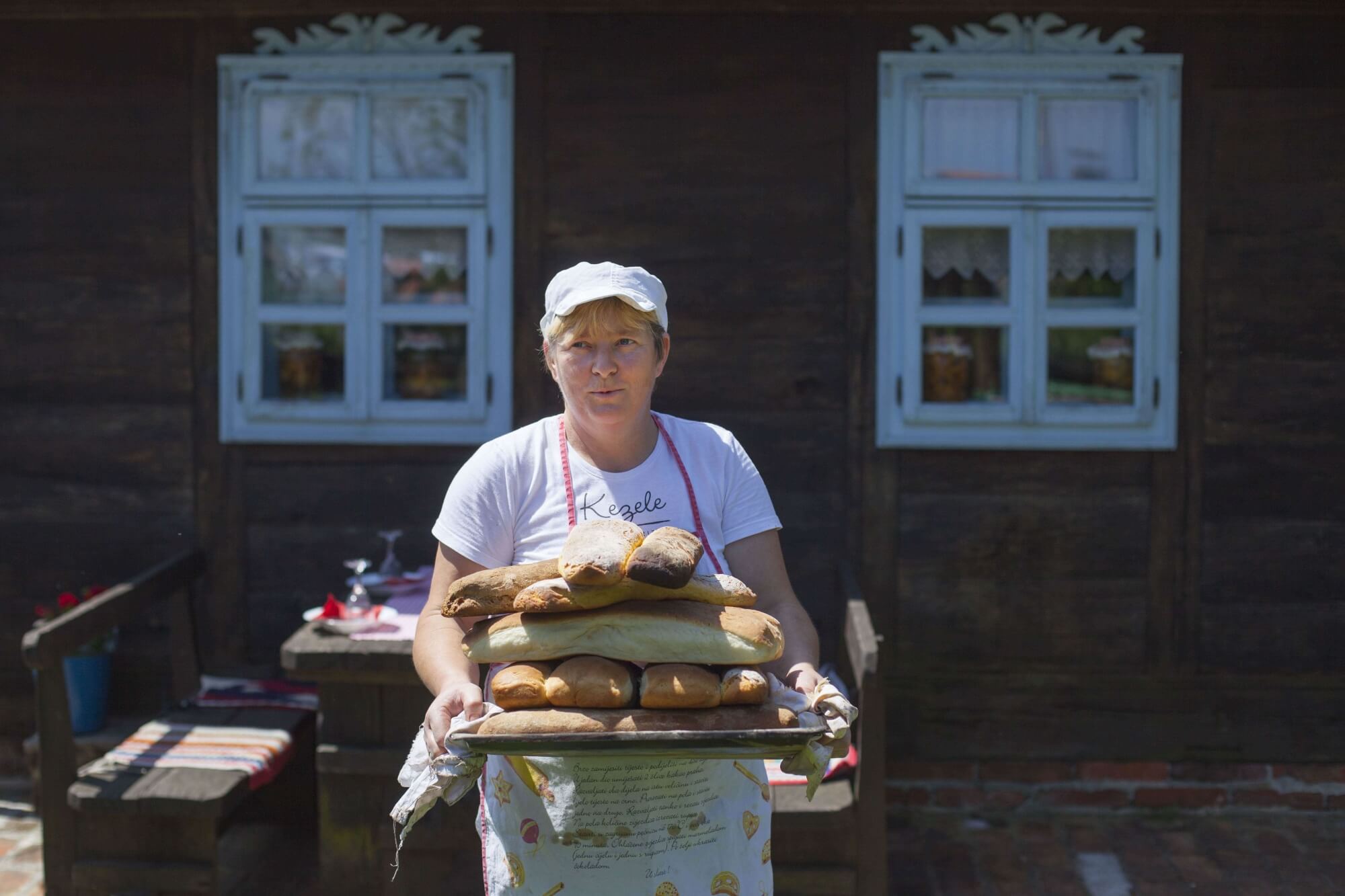 Kezele family farm © Davor Konjikušić
Kezele family farm © Davor Konjikušić
Another aspect of this, which is a more recently-observed element, is that visitors often want an insight into the actual lives, even the personalities of their hosts. They want not only to taste the homemade sausages you make, but they also want to know how you do it, where you do it, how you learned to do that. When they go to Spain, they want to know how the people there make their wine. And, when they come to Croatia, they want to learn how we do it here.
So, all in all, those of us in Seoski Tourism are really busy. We are in agriculture, yes, but we are also in tourism and we are also online. With this more recently-observed aspect, we will need to try and devote even more time to our hosting. It can be difficult to balance the demands on your time. But, in our workshops, we are trying to persuade people to talk more about themselves, their lives, their cultural heritage. And, if there isn't time to do everything themselves, then to involve different and often younger generations of the family. Sometimes within the hosting or alternatively just with the online promotion and presence.
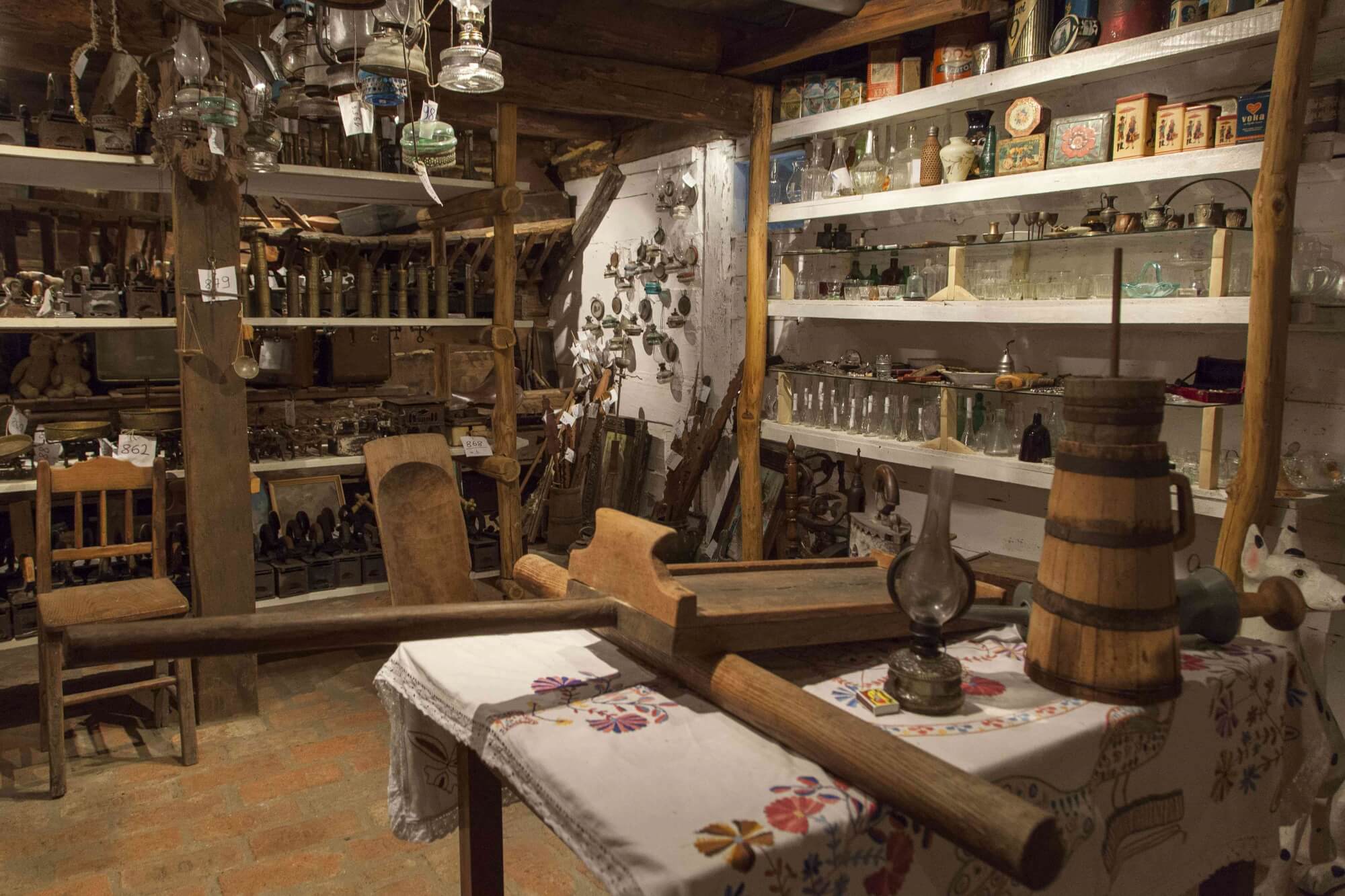 Kezele family farm ethno collection © Davor Konjikušić
Kezele family farm ethno collection © Davor Konjikušić
I've visited some family farms that were right at the start of their journey with Seoski Tourism and they seemed surprised that I was at all interested in what they do and how they do it. I think maybe they thought I was a bit crazy.
Yes, that is a response we sometimes also see at first. I think it's because our generation takes a lot of things for granted. We sometimes think that what we do is just what we do. We are not so good at showcasing it. “Why would I show someone how I make my cheese? I make my cheese like my grandmother used to make it” But, for those who open their doors to Seoski Tourism, inquiries about how they do what they do are only increasing. So, they seem to appreciate how we advise them in the workshops.
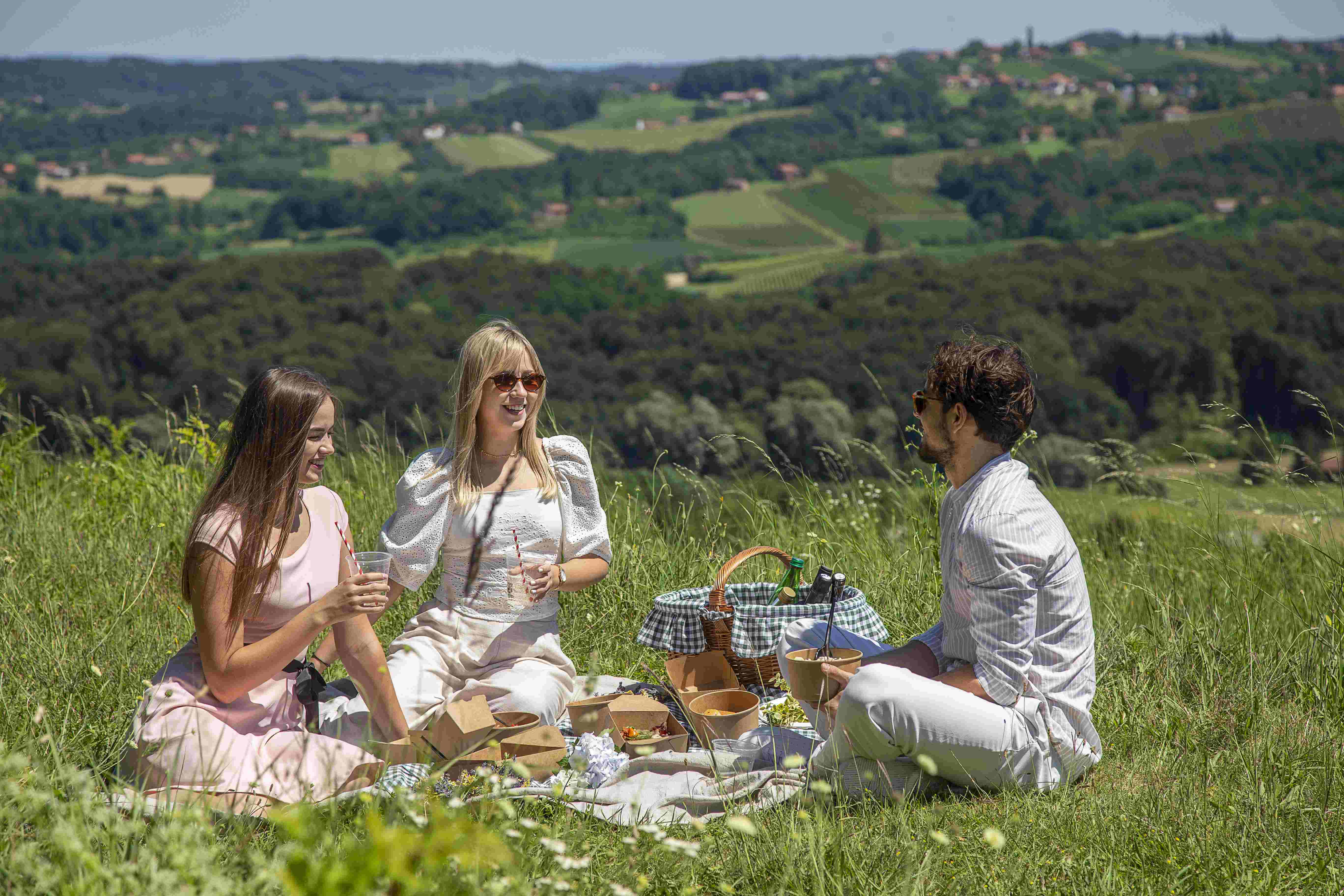 Picnic by Restaurant Međimurski dvori © Igor Nobilo
Picnic by Restaurant Međimurski dvori © Igor Nobilo
We are trying to let our producers know that Seoski Tourism is not just a platform to sell their produce and an overnight stay, but it's a full experience they can sell. There are agricultural farms in Austria that are established in tourism that you must pay only to visit. Of course, that doesn't happen currently anywhere in Croatia, even though some of our Seoski Tourism estates have sections that look like museums.
Some of these aspects are very new. And the feedback is great. I truly believe there are hidden treasures to be discovered in some Croatian villages. We are here to tell that story.
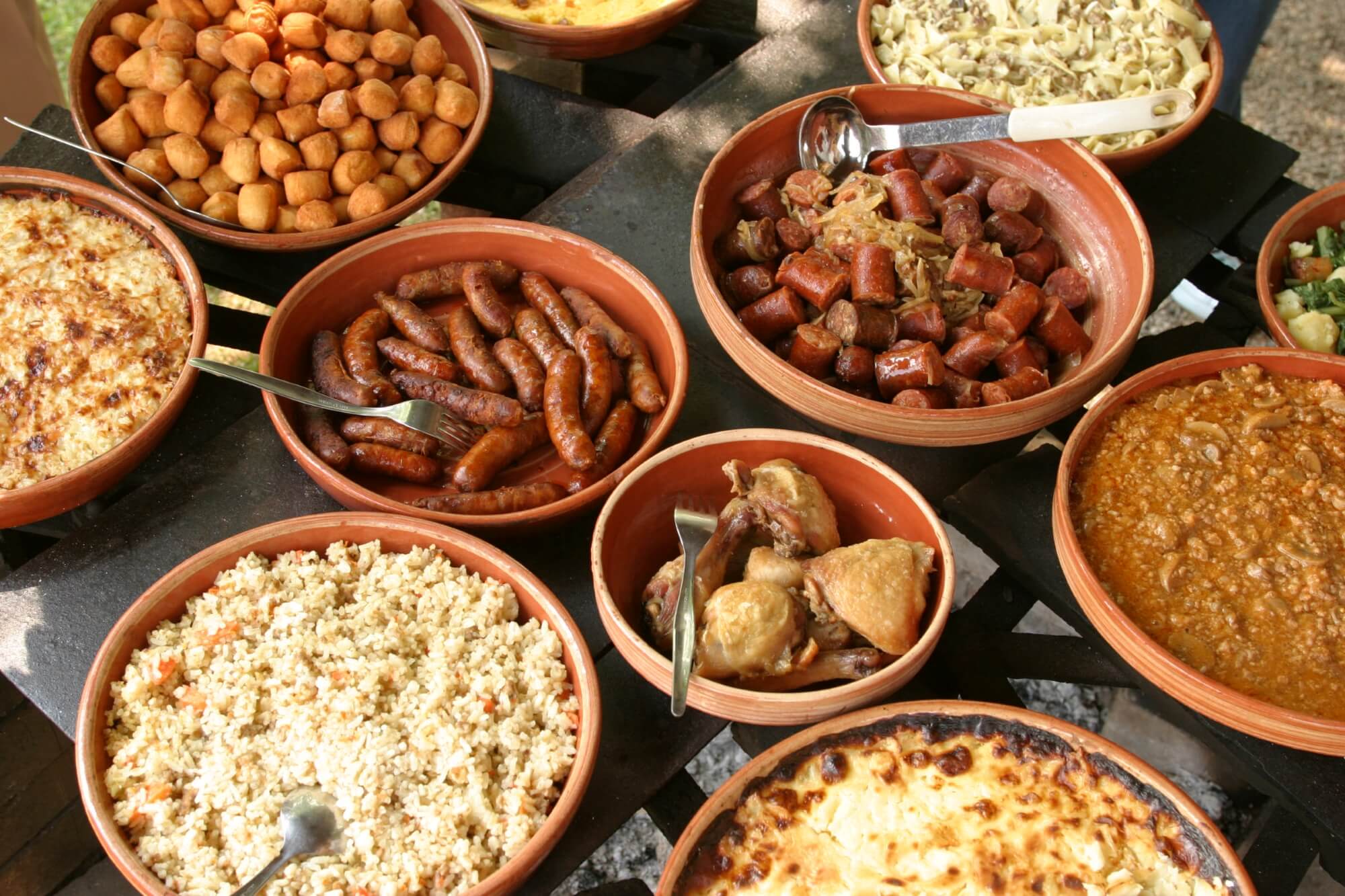 Selection of food from a Slavonian village © Mario Romulić
Selection of food from a Slavonian village © Mario Romulić
What is so rewarding about Croatian Seoski Tourism that international visitors would want to go to a traditional farm in some inland village instead of lying on the beach in Dalmatia for 14 days?
People come because they really want to see a different side of Croatia. And, there are many different aspects of Croatia to discover – not just Seoski Tourism, but also National Parks and Nature Parks. All of our current trends show us that more and more tourists are willing to come inland from the coast or to explore a different part of Croatia – inland Istria, for example, or continental Croatia.
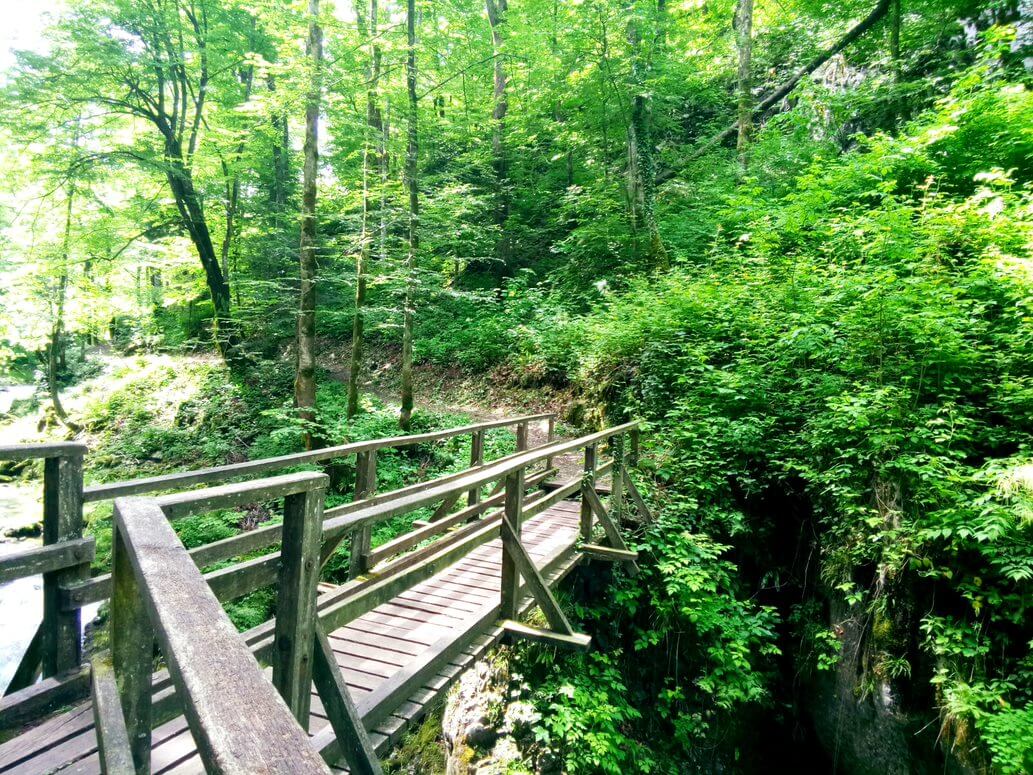 Kamačnik river canyon © Aleksandra Kuratko Pani
Kamačnik river canyon © Aleksandra Kuratko Pani
They really want to try authentic, local food. They want to eat healthy, to know what they are eating and how it is made. And, they want to experience flavours that are different from the usual ones they get from the supermarket.
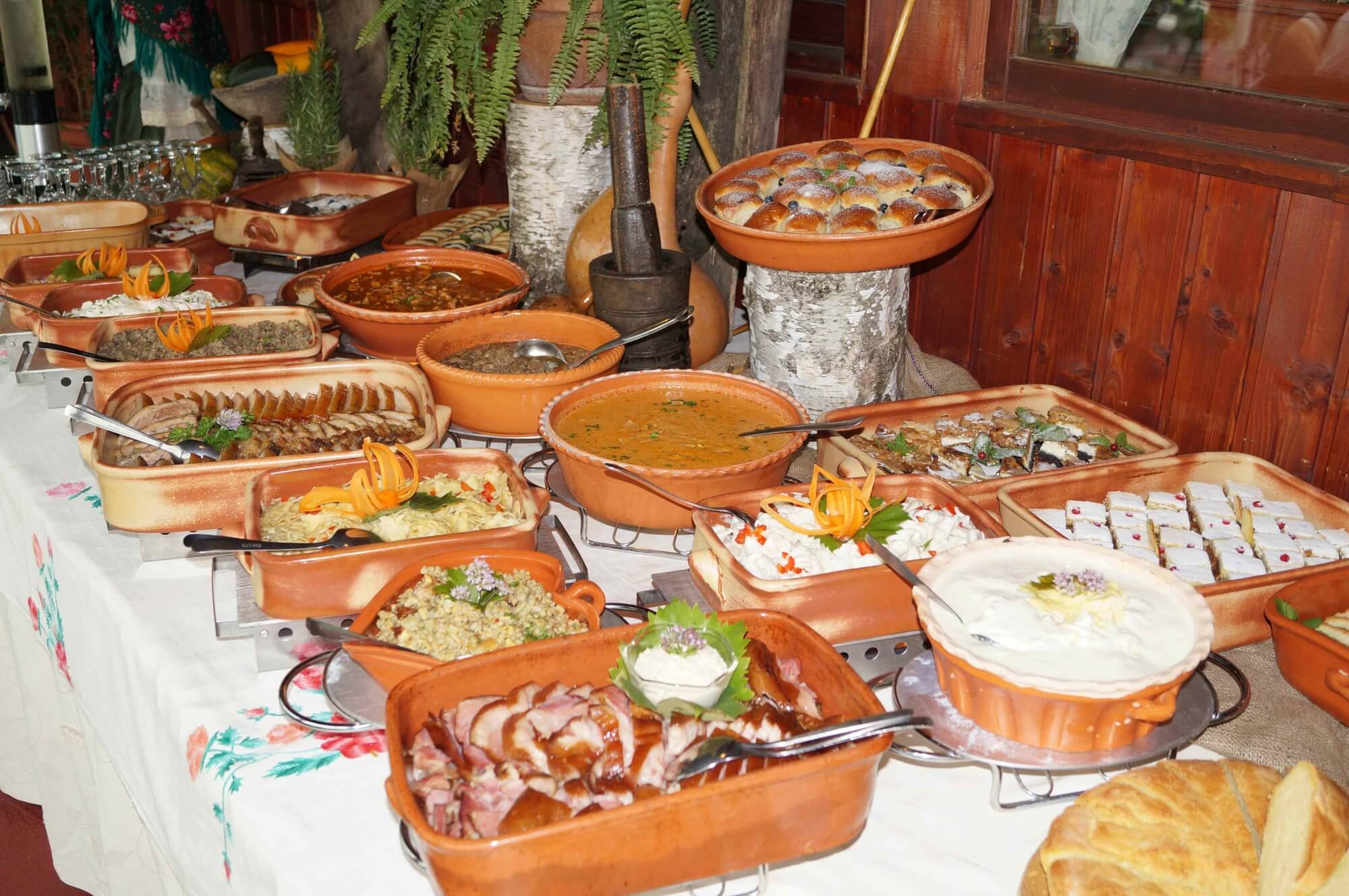 Traditional Međimurje table at Etno restaurant Međimurski dvori
Traditional Međimurje table at Etno restaurant Međimurski dvori
Also, I would say that with Seoski Tourism, people get to know better an authentic version of Croatia and its culture. It's a story we hear very often from our members. Some of them are visited by large groups from cruisers. These are people who might be on a cruise on the Adriatic and who journey inland for a day trip. Or, it might be a group who are cruising the Danube and disembark to visit a family farm in Slavonia, Baranja or Srijem.
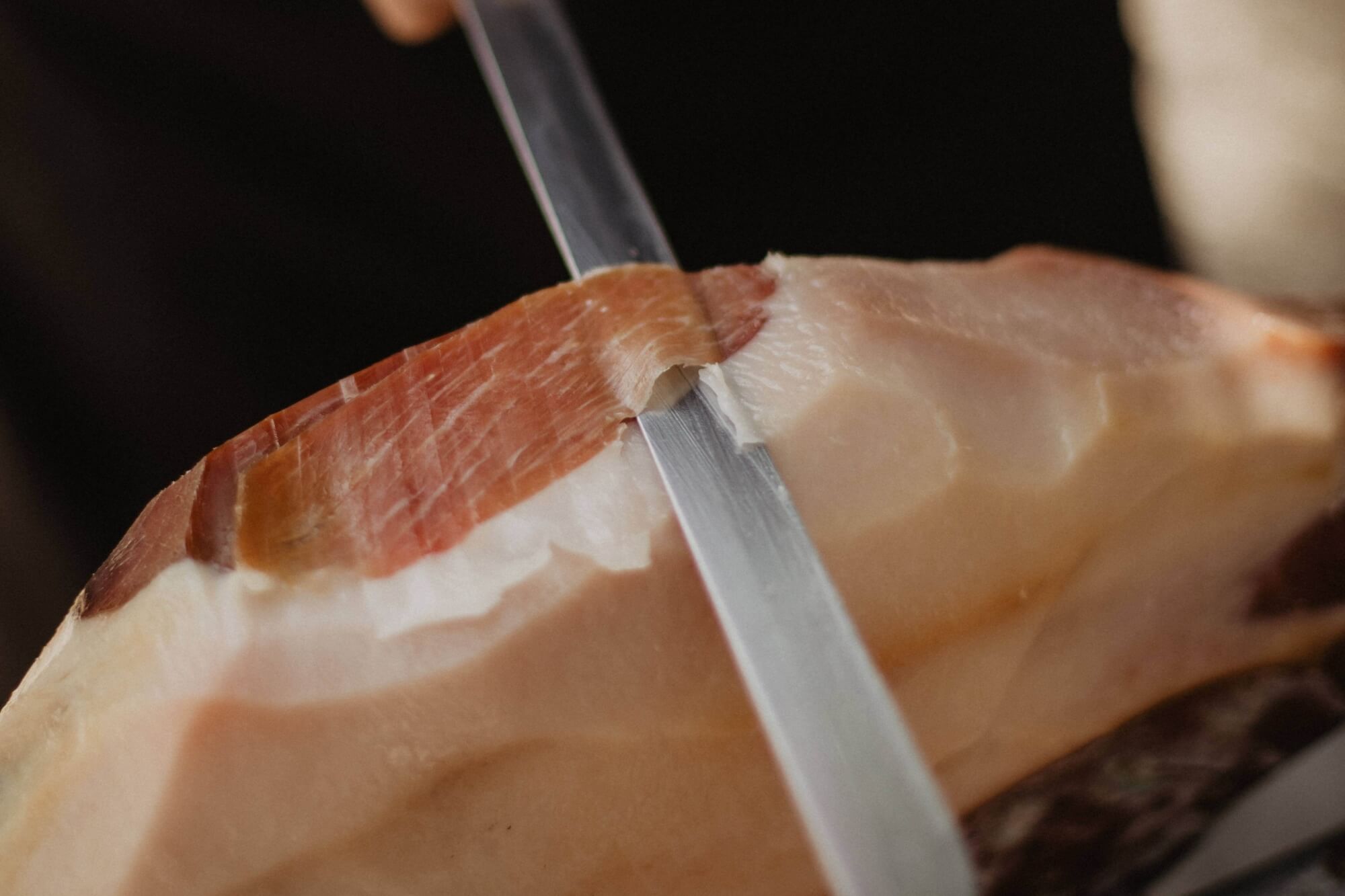 Prosciutto from Drniš at Agrotourism Kalpić © Ivana Kalpić
Prosciutto from Drniš at Agrotourism Kalpić © Ivana Kalpić
When they visit farming estates on day trips, it's very often a huge 'wow' moment for them. For many, in their minds, Croatia is simply sun and sea. And that's not entirely their fault. We, as a country, have done very little until now to promote alternative sides of Croatia. The visitors experience these wow moments because of the hospitality they receive and because of the tangible aspect of the visit. This is a modern aspect – people want to touch things, know how things feel, taste, smell. They want to ride on horses or feed them. Or take part in cultural activities. These parts of a visit to Seoski Tourism are very difficult to experience anywhere else.
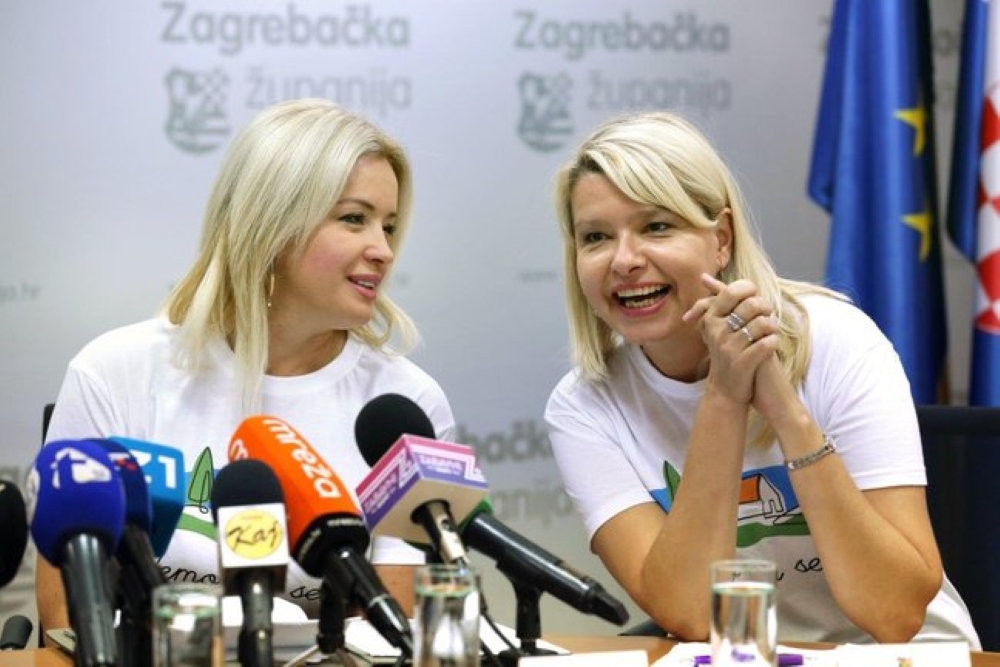 (left) Ivana Alilović, director of Zagreb County Tourist Board (right) Aleksandra Kuratko, secretary of Udruga ruralnog turizma Hrvatske (Croatian Rural Tourism Association) © Zagreb County
(left) Ivana Alilović, director of Zagreb County Tourist Board (right) Aleksandra Kuratko, secretary of Udruga ruralnog turizma Hrvatske (Croatian Rural Tourism Association) © Zagreb County
Udruga ruralnog turizma Hrvatske's online Seoski Tourism workshops begin today and their physical workshops continue next week in Istria.
If you'd like to read more about rural tourism in Croatia, then look here
Three Croatian Municipalities Nominated for UNWTO “Best Tourism Villages” Award
ZAGREB, Sept 19 Sept, 2021 - The municipalities of Kaštelir-Labinci, Motovun and Veliko Trojstvo are the Croatian nominees for the "Best Tourism Villages" award, launched in May this year by the World Tourism Organisation (UNWTO) as a pilot-project designed to promote the role of rural tourism.
As part of the project, UNWTO members could nominate up to three candidates - villages or municipalities that are initiators of sustainable social, economic and environmental changes in the member countries.
Kaštelir-Labinci and Motovun are municipalities in Istria County and Veliko Trojstvo is a municipality in Bjelovar-Bilogora County.
The UNWTO initiative includes three pillars and two awards. Villages that are exceptional examples of rural tourism destinations and are committed to sustainability in all its forms - economic, social and environmental - will be given "Best Tourism Villages" awards.
Villages that do not fully meet the criteria for this award will be provided with support from the UNWTO and its partners to work on problematic areas.
Also, a network of the best UNWTO tourism villages will be created to provide a platform for the exchange of experience and good practices, learning and creation of new development opportunities.
The purpose of the UNWTO initiative is to strengthen the role of tourism as a positive force for transformation, rural development and community well-being in an effort to reduce regional inequalities and fight depopulation of rural areas.
The winners of the UNWTO awards will be announced during the 24th UNWTO General Assembly session, to be held in Marrakesh, Morocco, on 30 November-3 December.
For more on lifestyle, follow TN's dedicated page.
For more about Croatia, CLICK HERE.
OPG Čudesna šuma: Paradise Reimagined in Beautiful, Traditional Baranja
May 13, 2021 – OPG Čudesna šuma: How an unexpected turn of events helped world-renowned photographer Mario Romulić realise his lifelong dream.
War and genocide and the aftermath. Famine. Disease. Death. In a former life, harrowing images filled the lens of internationally renowned photographer Mario Romulić. But thankfully, we're now far from such scenes.
In fact, at OPG Čudesna šuma - Mario Romulić's home and family farm - we're pretty much far from everything. One other eco-farm is his only neighbour. Well, unless you count the llamas the Romulić family keep out back. Occasionally, through the rich green of surrounding trees, you see birds flying above the branches. Probably they're toing and froing from Kopački rit. The nearby Nature Park is less than a kilometre from OPG Čudesna šuma. Famously, the wetlands are home to over 250 species of birds. They are also the reason why Mario Romulić is here.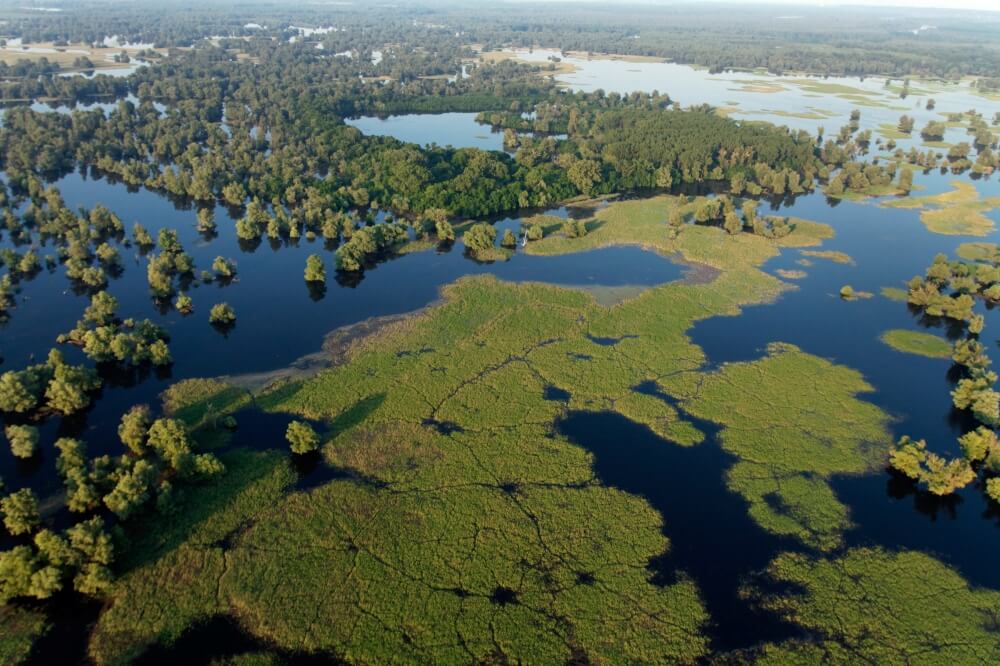 Kopački rit Nature Park © Kopački rit Nature Park.
Kopački rit Nature Park © Kopački rit Nature Park.
“Back then, I was very occupied with Kopački rit,” remembers Mario of the time, 21 years ago, when he moved to what is now OPG Čudesna šuma. “I was working as a cameraman for people like Reuters, all over the world. The assignments would last 7-10 days and I'd be in places like Afghanistan, Rwanda, Congo, Liberia, Bosnia. It was often quite dangerous. For the next 20 days, I would spend a lot of time in Kopački rit, trying to calm my nerves. It was something like a cure after seeing all these horrible scenes. Eventually, instead of travelling every day from my home in Osijek to Kopački rit, I decided to try and find something close by. And this is what I found.”
Just as this beautiful, natural landscape in Bilje, Baranja once served as a peaceful getaway for Mario Romulić, his OPG Čudesna šuma today does the same for others. Because, after dreaming for two decades of turning this blissful plot and homestead into a forest farm and eco-village, Mario Romulić is finally turning that vision into a reality.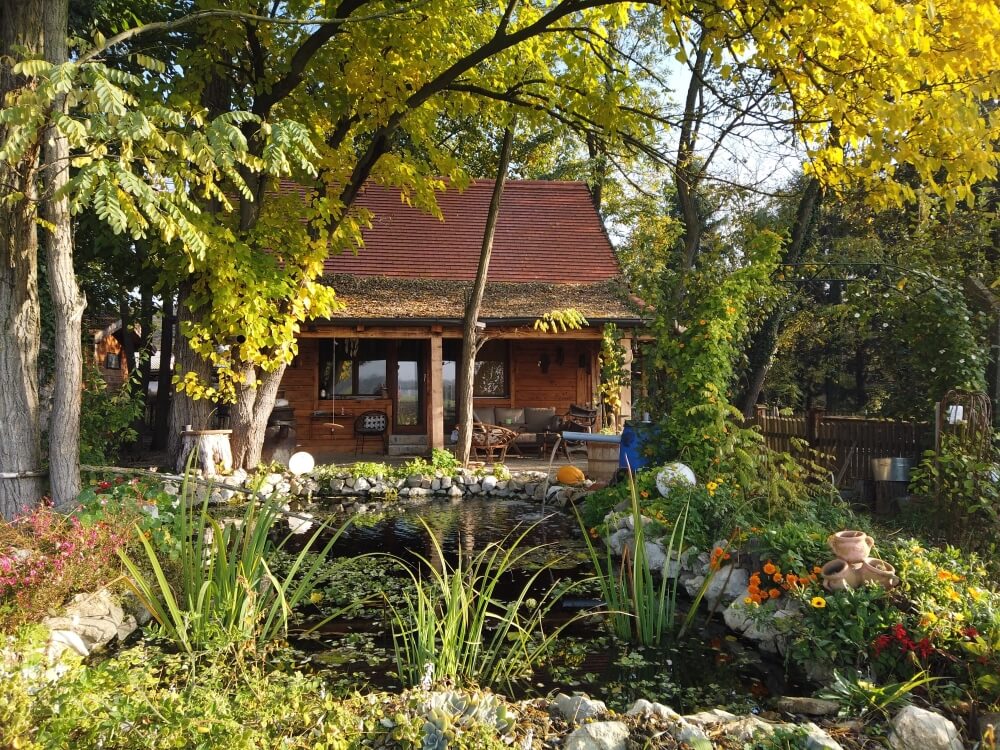 The impossibly pretty OPG Čudesna near Kopački rit Nature Park, Bilje Municipality, Baranja © OPG Čudesna šuma.
The impossibly pretty OPG Čudesna near Kopački rit Nature Park, Bilje Municipality, Baranja © OPG Čudesna šuma.
“Because of my job - first, travelling all around the world, then travelling Croatia - I did not even have much time to think about it, let alone do it,” says Mario. “But, then Corona came. Finally, I found myself at home. At last, I had time to work on my dream.”
OPG Čudesna šuma in the Month of Baranja Cooking (Mjesec baranjske kuhinje)
A group of 30 or so are Mario's guests today at OPG Čudesna šuma. They're here for a presentation of speciality cooking. It's the grand finale of the Month of Baranja Cooking (Mjesec baranjske kuhinje).
Over previous weeks, OPGs from all across the region have welcomed guests to try goulash, soups, stews, perklet and other traditional foods of the area. While visiting, they've been embraced by the beautiful landscape of Baranja. Not only have they discovered how this delightful, distinct cuisine tastes, but also they've learned exactly how it's prepared. However, they've evidently saved the best for last. On the menu today, river fish inventively cooked, accompanied by a riotous rainbow of seasonal vegetables.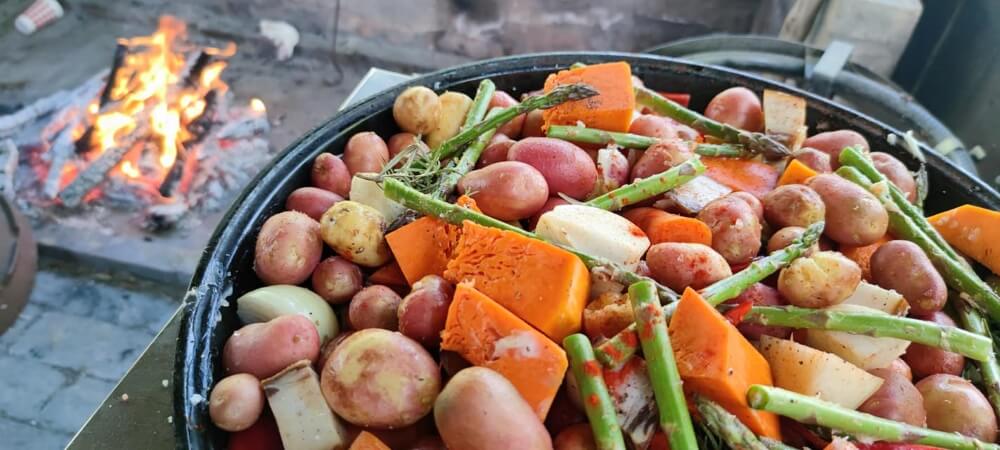 Seasonal vegetables of Baranja in springtime at the Month of Baranja Cooking (Mjesec baranjske kuhinje) © OPG Čudesna šuma.
Seasonal vegetables of Baranja in springtime at the Month of Baranja Cooking (Mjesec baranjske kuhinje) © OPG Čudesna šuma.
It's a beautifully sunny day, right at the start of May. It depends on your preference, but looking across this happy vista in the glorious sunshine, it's difficult to imagine this not being the perfect time to be in Baranja. Young children are raised to chest height by their parents so they can meet Mario's free-roaming llamas face-to-face. The children's faces flit between surprise, curiosity and delight. The llamas return their stare. They're used to welcoming new guests.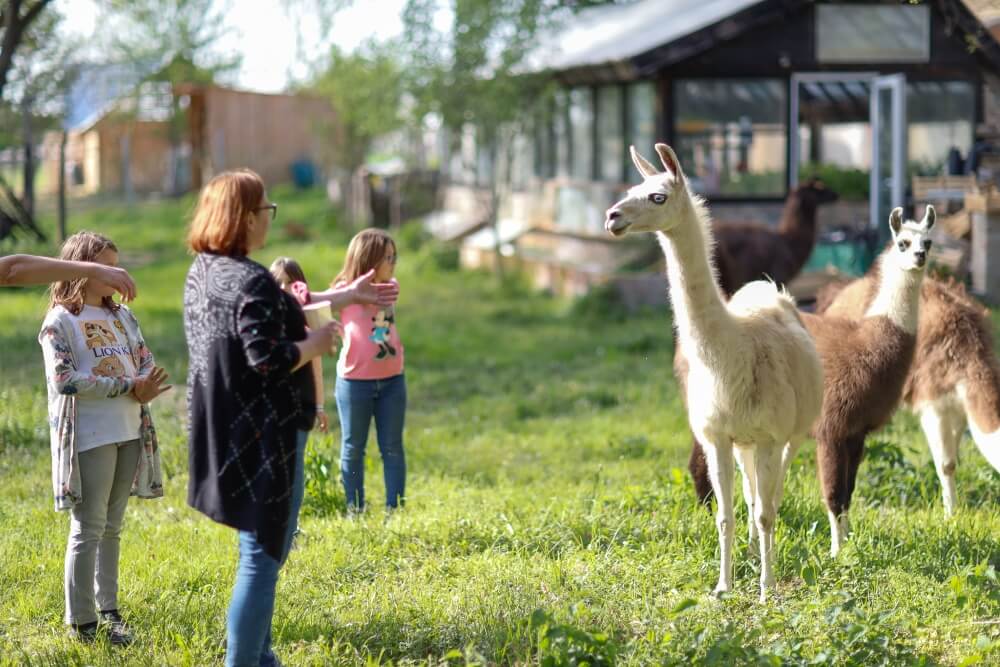 Meeting the Romulić family llamas at OPG Čudesna šuma © Turistička zajednica Općine Bilje - Kopački rit.
Meeting the Romulić family llamas at OPG Čudesna šuma © Turistička zajednica Općine Bilje - Kopački rit.
Partially shaded by trees, the smiling adult guests sit casually on wooden benches around a central, outdoor cooking area. Several open fires display a range of traditional cooking methods. Steam rises from a cast-iron stove suspended over one. Beneath the vapours, you can make out the dish is fish paprikash. It's unmistakable because of the deeply red coloured bubbles, a result of generous amounts of paprika.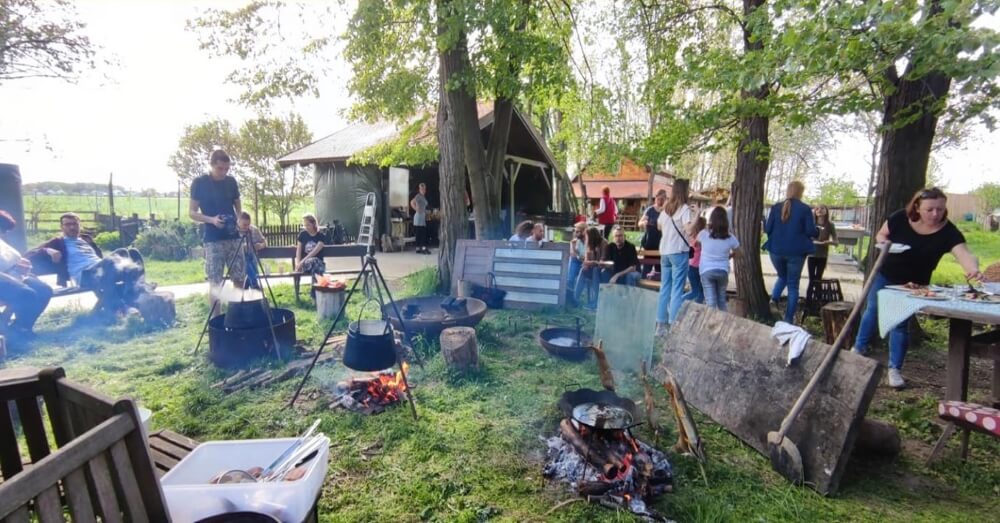 Guests enjoy a warm springtime day at OPG Čudesna šuma during the Month of Baranja Cooking (Mjesec baranjske kuhinje), as fish paprikas cooks over an open fire © OPG Čudesna šuma.
Guests enjoy a warm springtime day at OPG Čudesna šuma during the Month of Baranja Cooking (Mjesec baranjske kuhinje), as fish paprikas cooks over an open fire © OPG Čudesna šuma.
A huge bag of this paprika sits propped up, close by. It's from another organic OPG, just a kilometre or so from here. The colour is vivid, impossibly red, unrecognisable from anything store-bought. At the next fire, pike impaled on wooden sticks are placed far enough from the flickering flames so they cook slowly and do not burn.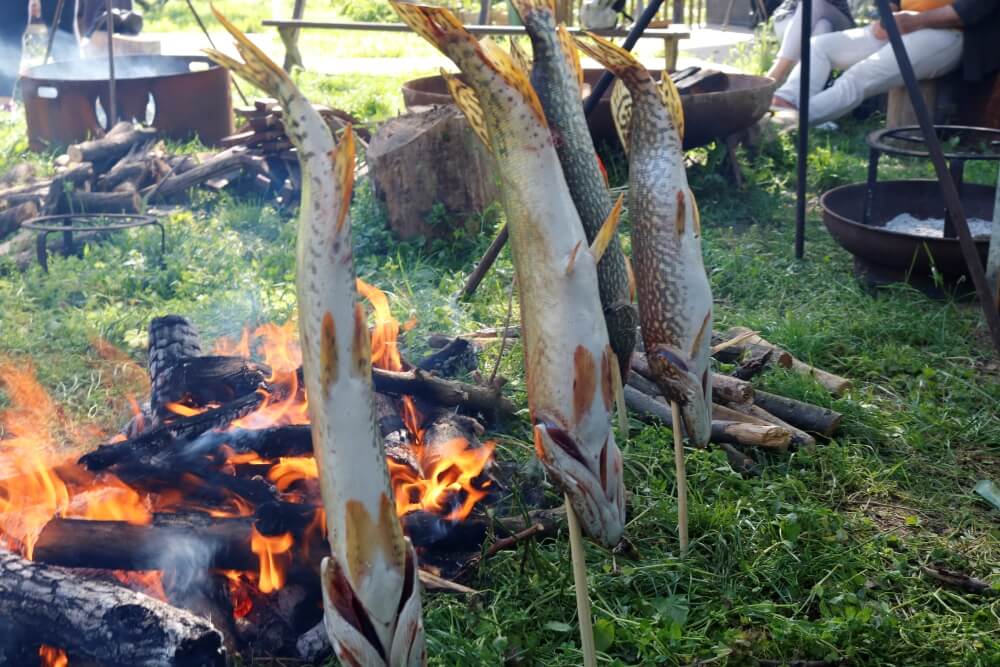 Pike impaled on sticks, cooking by an open fire at OPG Čudesna šuma @ Marc Rowlands.
Pike impaled on sticks, cooking by an open fire at OPG Čudesna šuma @ Marc Rowlands.
In the outdoor kitchen, Mario Romulić's co-chefs prepare an unending supply of fish dishes and vegetables. Carp, catfish, trout, bream. There's a bounty of fresh asparagus. It's that time of year. With the restraint of experience, they've cooked it perfectly. After the crunch of the bite, the flavour explodes. They're seasoned simply – delicious olive oil and sea salt.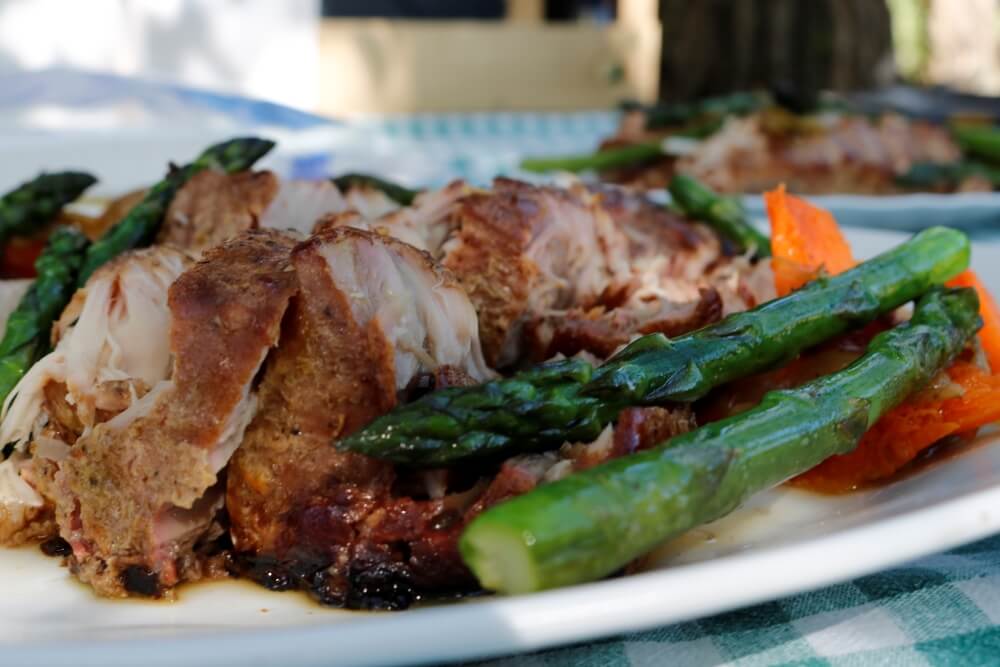 Seasonal asparagus, perfectly cooked, served with smoked river fish © Marc Rowlands.
Seasonal asparagus, perfectly cooked, served with smoked river fish © Marc Rowlands.
A group of peers – accomplished chefs from Osijek-Baranja restaurants – peak over the shoulders of Romulić's co-chefs. They're admiring the inventive techniques employed. Although, being chefs, they can't help themselves. They end up briefly forgetting their families in order to help out.
Mario Romulić, the host with the most
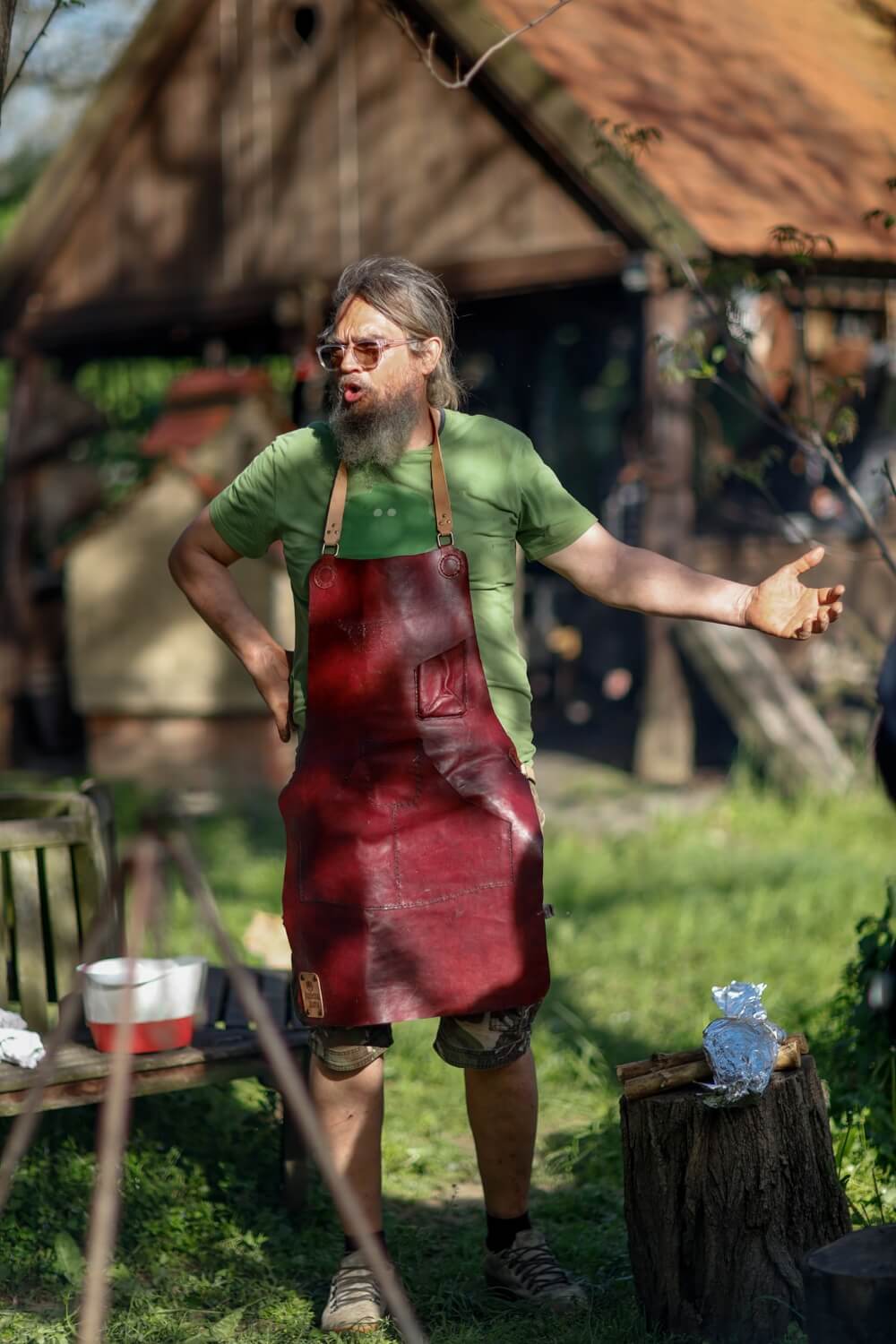 Mario Romulić © Turistička zajednica Općine Bilje - Kopački rit.
Mario Romulić © Turistička zajednica Općine Bilje - Kopački rit.
After all the guests arrive, Mario Romulić holds court. Cheerily he welcomes us all to OPG Čudesna šuma and the event. Without question, the success of rural, village tourism depends on the personalities of the hosts. It's no good plonking a group of visitors in a pretty place and throwing some food in front of them. We've all seen trees, grass and food before. Rural tourism is not just about the place, it's about the experience, the ambience. And, especially, it's about the people.
Hands down, the OPGs of Slavonia and Baranja are the best in Croatia at this. The folks here are famous for their friendliness, warm welcome and big personalities. And, Mario Romulić has one of the biggest of them all.
In the research for this reportage, looking back at archive pictures of Mario Romulić is startling. During his years spent as an international photographer, he himself has been photographed many times – on assignment in distant countries, at the opening of exhibitions that have showcased his celebrated work. In most, there's an intensity to his stare. It's sometimes difficult to look at. He looks like a man who has tales you never want to hear, like a man who has seen too much.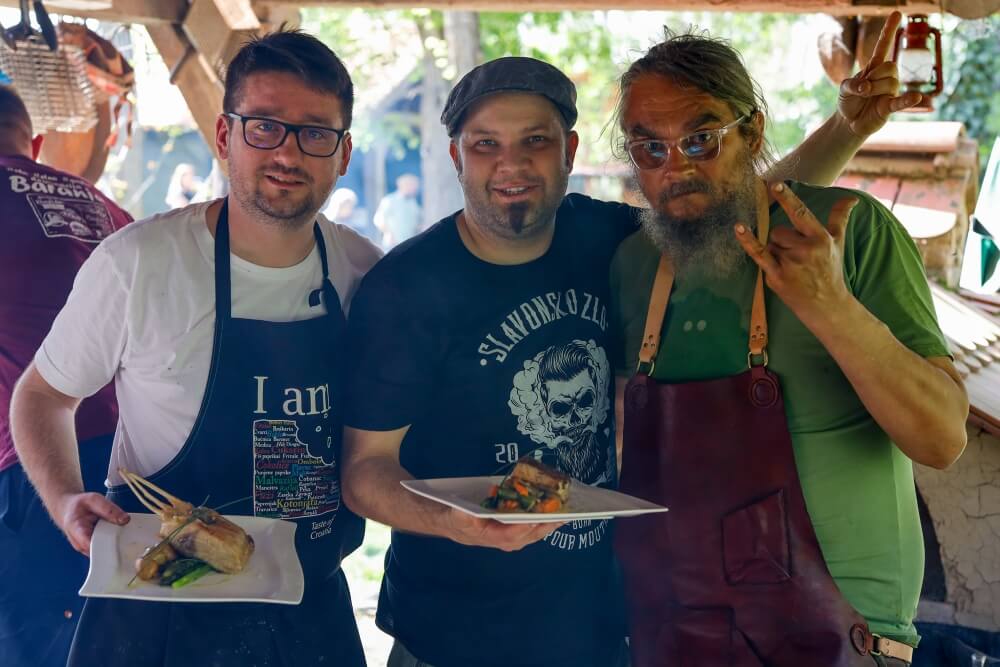 (L- R) OPG Čudesna šuma co-chef at the event Mihael Tomić, renowned Osijek chef Ivan Đukić currently of Osijek's Lipov Hlad and a happy Mario Romulić © Turistička zajednica Općine Bilje - Kopački rit.
(L- R) OPG Čudesna šuma co-chef at the event Mihael Tomić, renowned Osijek chef Ivan Đukić currently of Osijek's Lipov Hlad and a happy Mario Romulić © Turistička zajednica Općine Bilje - Kopački rit.
By comparison, the Mario Romulić that welcomes us at OPG Čudesna šuma today is unrecognisable. Sure, there's a little more grey to his long hair and beard but, otherwise, he looks incredibly healthy and happy. The intense stare is gone, replaced by a warm, wide smile that shows across his entire face. Even in early May, he has a darkened skin tone, the telltale signs of a man who spends much of the day outdoors. Romulić's enthusiasm for his guests and the event is palpable. After his sincere welcome, this enthusiasm is immediately transferred to each of his guests.
Mrs Romulić ensures everyone's glass is overflowing with wine or juice. One of Mario's teenage sons helps out with the food, while the other is taking photographs of the event. Well, someone has to do the photography now that dad wants to be a chef and host! Mario himself is engulfed in smoke. Among the other duties he's assumed today, Mario is tending a smoker. Without a doubt, this is the most revelatory cooking method we meet today.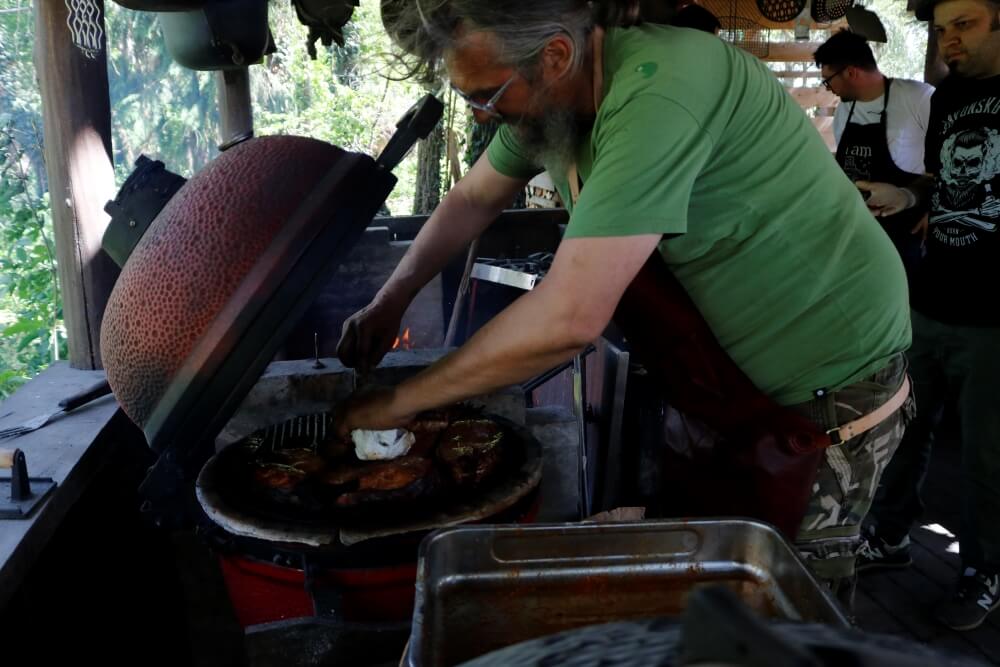 Mario Romulić tends to smoked river fish, a revelatory gastronomic experience at OPG Čudesna šuma © Marc Rowlands.
Mario Romulić tends to smoked river fish, a revelatory gastronomic experience at OPG Čudesna šuma © Marc Rowlands.
Smoked fish of Slavonia and Baranja at OPG Čudesna šuma
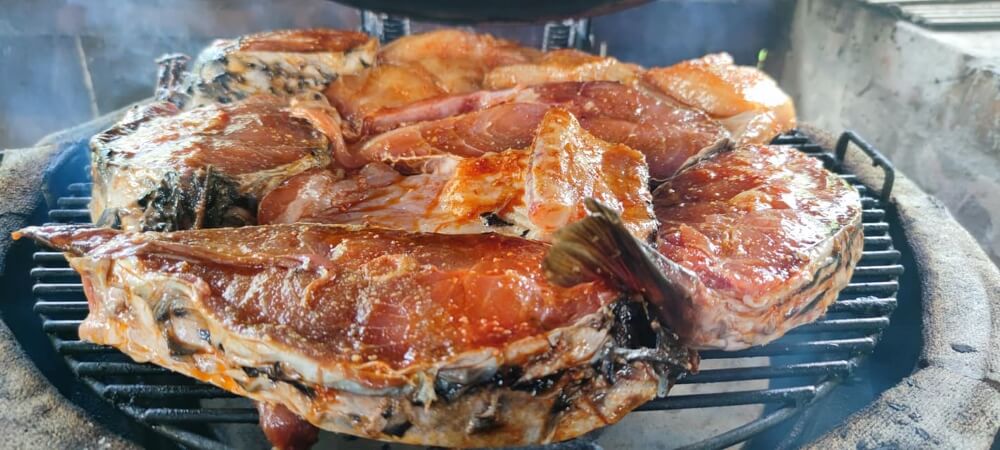 An American-style smoker, loaded with river fish. TOP TIP: A great way to stop fish sticking to the grill of your barbecue or smoker is to place them on top of a layer of lemon slices © OPG Čudesna šuma.
An American-style smoker, loaded with river fish. TOP TIP: A great way to stop fish sticking to the grill of your barbecue or smoker is to place them on top of a layer of lemon slices © OPG Čudesna šuma.
“We do have smoked fish here, but not in this way,” he says. “This is more like an American grill. I never heard of anyone trying Baranja cooking like this. Actually, I never heard of anyone nearby who has a smoker like this. The first time I tried stuka (pike) in the smoker, that was unbelievable. It's incomparable, really special.”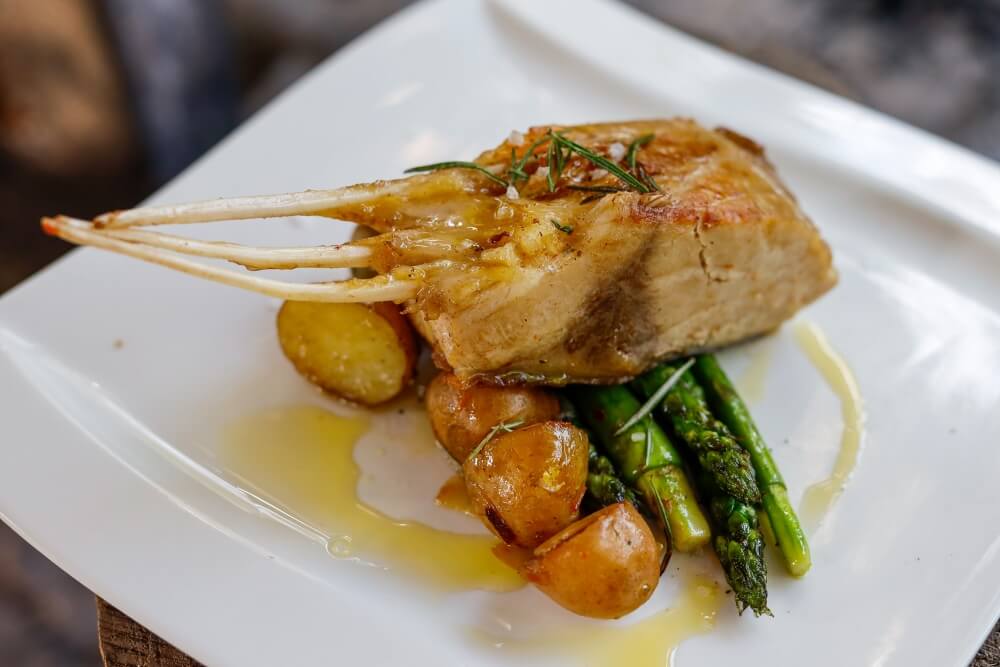 Exquisite presentation of river fish by the enthusiastic team of OPG Čudesna šuma © Turistička zajednica Općine Bilje - Kopački rit.
Exquisite presentation of river fish by the enthusiastic team of OPG Čudesna šuma © Turistička zajednica Općine Bilje - Kopački rit.
“In Slavonia and Baranja, there are just a few ways we usually cook our river fish - carp on sticks, fish paprikash, perklet and fried fish. So, we tried something new, to expand the palette. For instance, almost nobody eats Babuška (a type of carp). They feed it instead to their pigs. It costs 5 kuna a kilo! But, if you cook it in this completely natural way, it's delicious.”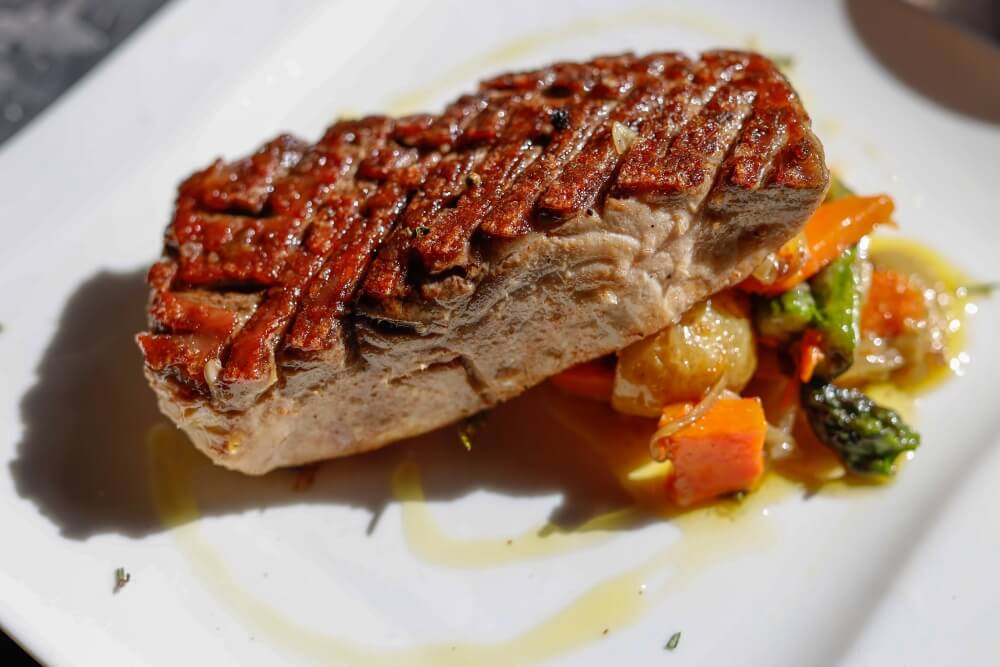 More river fish, cooked by the team of OPG Čudesna šuma © Turistička zajednica Općine Bilje - Kopački rit.
More river fish, cooked by the team of OPG Čudesna šuma © Turistička zajednica Općine Bilje - Kopački rit.
He's not wrong. Today's mountain of different smoked fish is the talk on most of the adult lips. The rich flavours surprise. Compliments and returns for second helpings ensue. Mario stands to one side, happily watching as his smoked fish secret escapes. In the future, he plans similar events based on other regional foods - Black Slavonian pig, wild meats like deer or boar. Eventually, in the seven hectares of land he owns here, he would like to expand OPG Čudesna šuma as an eco-village, with beds for visitors, a natural swimming pool and then surround it with a food forest. Big plans. It looks as though the camera may stay more permanently in the hands of his son. Because it's difficult to imagine Mario Romulić leaving his happy place and the realisation of his long-held dream.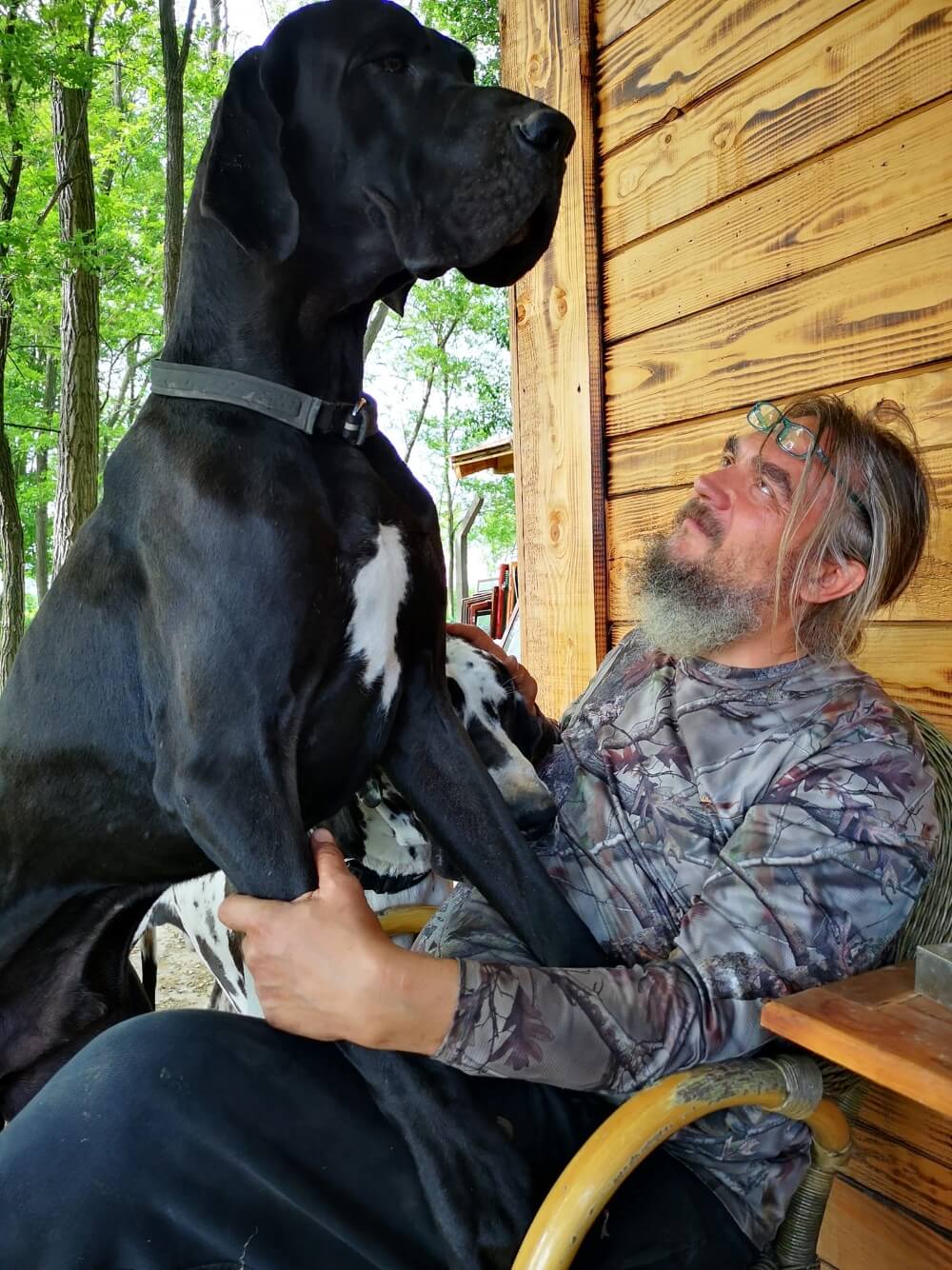 Mario Romulić in his happy place, with a friend © OPG Čudesna šuma.
Mario Romulić in his happy place, with a friend © OPG Čudesna šuma.
Both the author and Total Croatia News would like to thank the following for their invaluable help in creating this article: Ivana Jurić and the Tourist Board of Osijek-Baranja County, OPG Čudesna šuma, Mario Romulić and family, Renata Forjan and Turistička zajednica Općine Bilje - Kopački rit and Domagoj Butković of expert travel guides to Slavonia and Baranja, Kulen travel.
Rural Tourism in Croatia: Another Ace For the Season
April 22, 2021 - While this year's season is still leaving the country in suspense, another advantage for successful results can be seen in the development of rural tourism in Croatia.
Numerous experts and scientists participated earlier this month in an online panel „Quality and Sustainability in Rural Tourism“, reports Klubselo.hr, an official website of the Croatian Association for Tourism and Rural Development. This is just one part of the Quality and Sustainability in Rural Tourism project backed by the Ministry of Tourism. The project concluded on April 15, and it saw panels, education, and a concluded study of management in rural tourism to help the development of the field.
It's established that introducing quality standards and a special law on rural tourism is needed.
„The Croatian wine scene has strongly developed. We can't compete with quantity, but we can with quality and richness of wine sorts, particularly native sorts which the world craves for more and more“, said faculty professor in Zagreb, Edi Maletić, for Klubselo.hr Agronomy.
Quality over quantity can, of course, be applied to rural tourism in general. That particular field saw raised interest with the novel coronavirus pandemic as tourists are now more interested in loneliness, peace, and authenticity.
Božo Skoko, an expert on PR and marketing and a professor at the Faculty of Political Science in Zagreb, says that traveling limitations encourage exploration of rural areas and consumption of local products.
„Crisis is an opportunity for further touristic development. New norms and behavior rules appeared. We have more free time for family, contemplating, hobbies, meditation… social responsibility and ecological consciousness arise, and these factors have a more and more significant role in choosing destinations“, said Skoko to Klubselo.hr.
Dijana Katica, president of the Croatian Association for Tourism and Rural Development, says that there is a lot to learn from Italy, France, and Austria who have a long tradition of rural tourism.
„Big attention is given to quality standards that aim at the diverse offer, specialization of services and to guarantee quality to users which are measured by elaborated standards“, describes Katica of the practice of the three mentioned countries.
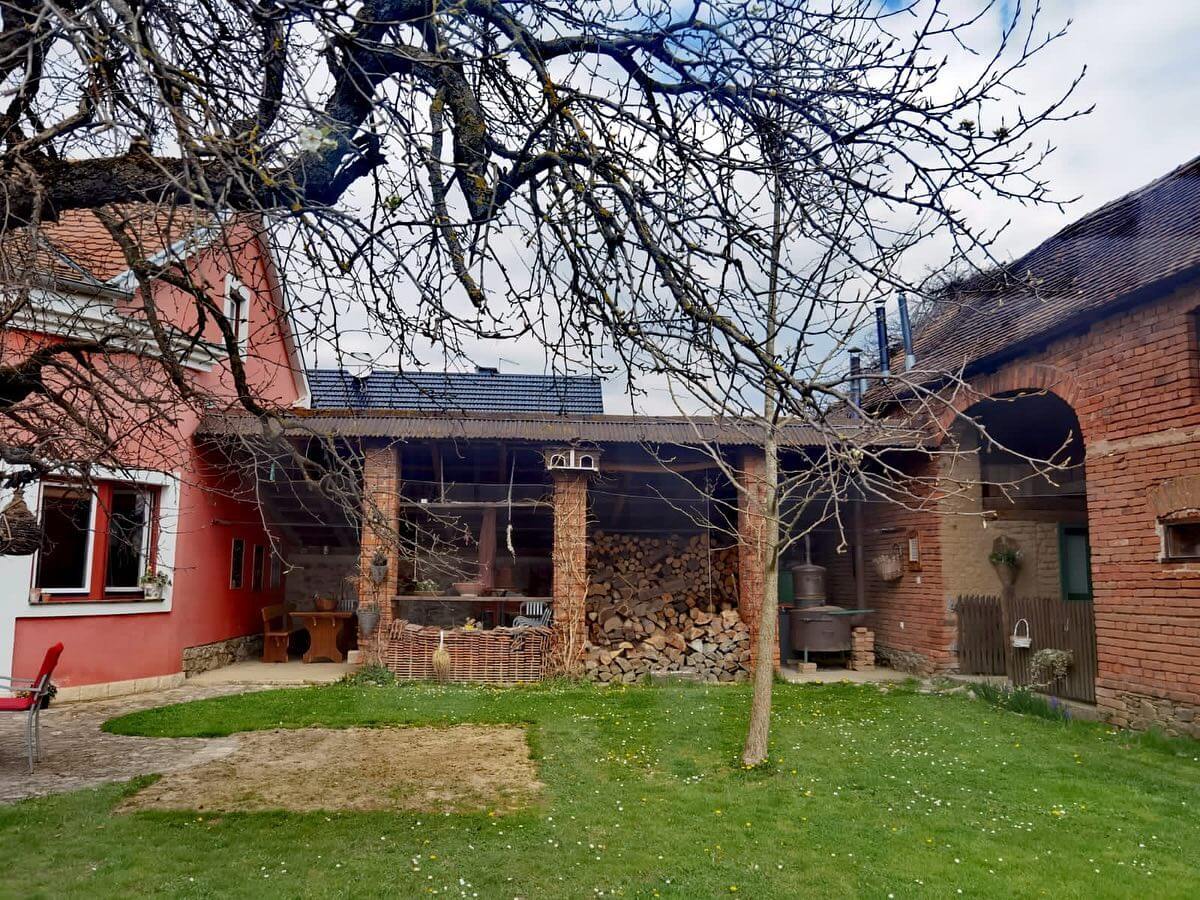
Vacation House "Slavonka" © Hrvatska udruga za turizam i ruralni razvoj "Klub članova Selo"
Hard work for season preparation already done
Croatia is trying to secure the uncertain season of 2021. While destinations as Vir seems to hold quite good, the overall strategy of vaccination and testing points by the Croatian Tourist Board is seen as a good way to make people safe while visiting Croatia. Apart from that, as TCN already reported, a lot is investing in health tourism, nautical tourism sees the digitalization of its system for easier arrival, and local initiatives in Novalja are also committed to expanding its offer further from party tourism of Zrće beach.
No doubt that further development of rural tourism can only be a hidden ace for the 2021 season rescue. And the still relevant Touch of Baranja photo exhibition in Zagreb is the first step of a specific action.
As Croatian wine is one of the more developed parts of the rural offer, learn more about Croatia's wine on our TC page.
For more about travel in Croatia, follow TCN's dedicated page.
Virovitica Among Best in Terms of EU Fund Withdrawal for Rural Development
''We need to give young people the ability to learn and improve, to be informed about the measures implemented by the EU through EU funds and self-employment,'' stated the mayor of Virovitica.
As PD i VL native tim/Poslovni Dnevnik writes on the 4th of February, 2019, Virovitica is the fourteenth Croatian city in which the Ministry of Regional Development and EU Funds organised an informative-educational event entitled Regional Days of EU Funds, with the aim of informing the general public about the possibilities of financing from EU funds and strengthening regional development, as well as the possibilities for overall social and economic growth of Croatia which derive from EU fund availability. The event was held at the Virovitica Cultural Centre, which, ironically with the help of the EU funds, is about to be reconstructed soon.
Since Virovitica is mainly made up of agricultural land, its projects are mostly reported by small and medium-sized entrepreneurs and farmers, and according to the latest statistical data, Virovitica-Podravina County is among the best in Slavonia and Baranja in terms of EU cash withdrawal for rural development funds and for micro and small enterprises - up to 3,400 kuna per capita. "EU funds concern everyone, we're working on public projects in the public sector to set standards, and it's important to utilise them and improve business," said Ivica Kirin, Virovitica's mayor.
National development strategy
Virovitica-Podravina County Prefect Igor Andrović presented some statistical data according to which the VIDRA Development Agency in 2018 carried out 194 projects for small and medium-sized entrepreneurs and farmers, totaling a massive 450 million kuna.
"We've started on projects which concern Slavonia, Baranja and Srijem, such as the renovation of the hospital, the construction of a network of entrepreneurial incubators, the construction of a technological innovation centre, the hall for the Viroexpo fair and the energetic renewal of the cultural centre.
This year, we expect the realisation of about 150 projects we submitted last year,'' Andrović said, pointing out that with the new division in the four statistical regions, small and medium entrepreneurs in their area as well as in Sisak-Moslavina and Karlovac County will receive up to 75 percent of support from the EU funds, as opposed to the previous 45 percent.
State Secretary at the Ministry of Regional Development and EU Funds, Velimir Žunac, reminded attendees that by the year 2020, the seven-year financial period during which Croatia learned, made mistakes and matured will end, and more opportunities in the next financial period of 2021-2027 will come.
"EU funds are our reality - this county and this city are a good example of how European Union money can be used, as statistics show. In January 2017, Croatia was [withdrawing] under 9 percent of the contracted funds and by the end of last year, that number was more than 62 percent, or 6.6 billion euros of contractuality, we've made a significant step forward. In Croatia, 80 percent of public investment comes from the EU and it's important to maximise its use," Žunac pointed out.
He announced that the Croatian Government is ready and that the budget is stable for the new cycle and financial period from 2021 to 2027, recalling that the National Development Strategy of the Republic of Croatia is under development up until 2030, with twelve thematic and working groups working intensively.
An interesting panel discussion was then held, entitled "The development of Virovitica through European Union funds", involving representatives of various institutions as well as local entrepreneurs with experience of using money provided by EU funds. At the very beginning, Mayor Ivica Kirin emphasised that in the near future they want to identify the strategies and priorities that Croatia needs to develop which will create faster and better economic growth.
"We need more staff, especially those who will write projects. At the same time, we must give young people the ability to learn and improve, to be informed of the measures that the state is implementing through EU funds and self-employment," Kirin said.
The results were presented by Tihana Harmund, Director of the VTA Development Agency, who works for all institutions in Virovitica, companies, institutions, as well as for entrepreneurs and farmers, to whom she offers advice and assistance in writing up and implementing EU projects.
"We have prepared the documentation for all projects, including Pejačević Castle worth 82 million kuna, the improvement of Virovitica's water and communal infrastructure of 150 million kuna, as well as the renovation of schools, kindergartens and other institutions. For smaller projects, we provided the necessary funds to farmers, entrepreneurs and civil society organisations,'' stated Harmund.
Cooperation between the city and the county
''Services and institutions were networked for the preparation of projects, and the cooperation between the City of Virovitica and Virovitica-Podravina County is excellent,'' said Neda Martić from the VIDRA Development Agency.
"An entrepreneur can now get a valid building permit in two days, and in addition to being a regional coordinator, our agency is working on strategy and writing up infrastructure projects. We currently have 245 projects related to the economy,'' Martić added.
Make sure to stay up to date by following our dedicated politics page for much more.
Click here for the original article by PD i VL native tim on Poslovni Dnevnik
Another Face of Incredible Croatia - Continental Croatia
Croatia away from the coast may not have all the glitz and the glamour of Dalmatia and its yachts, but what it does have isn't worth missing...
Tax Reform Especially Burdening Rural Agriculture and Tourism
"At this rate of introduction of compensation measures, there won’t be anyone left to make use of them,” said Janko Kezele, Deputy President of the Rural Tourism Association of Croatia.


